#the ultimate episode tournament
Text
The Ultimate Episode Tournament: Round 4 Match 8
20 notes
·
View notes
Text
For those who don't follow us elsewhere, we run a fan favourite episode bracket every 16 episodes and we've just had our most recent one. So far, our listeners have picked these episodes as their favourites:
Episode 8: OUTATIME

Comparing Back to the Future and Peggy Sue Got Married, twin films about people travelling back in time from the 80s and making bad decisions that threaten to change their whole futures.
Listen on: Our Website | Spotify | Apple Podcasts
----------------------------------------------------------------------------
2. Episode 20: i, Rabbit
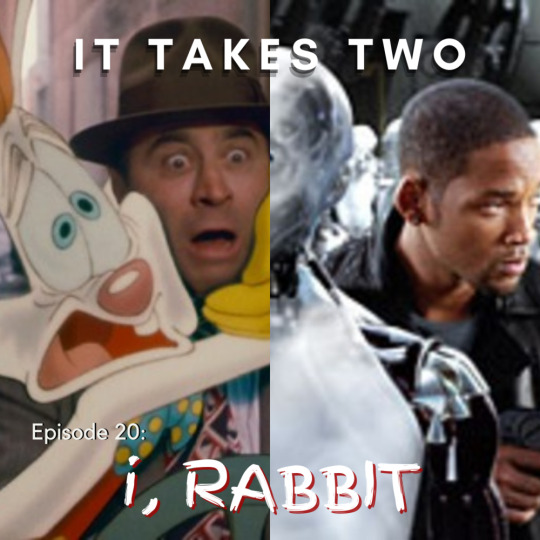
Comparing Who Framed Roger Rabbit and i, Robot - completely different films that somehow are exactly the same, following jaded detectives dragged into a murder investigation involving beings they are prejudiced against.
Listen on: Our Website | Spotify | Apple Podcasts
----------------------------------------------------------------------------
3. Episode 37: It's a Very Merry McCarthy Christmas

Comparing It's a Wonderful Life and It's a Very Merry Muppet Christmas Movie, two Christmas movies about prominent and well-loved members of a community going through hardship and being shown a world in which they were never born.
Listen on: Our Website | Spotify | Apple Podcasts
----------------------------------------------------------------------------
4. Episode 50: Dude Looks Like a Lady

Comparing The Birdcage and Mrs. Doubtfire, two iconic Robin Williams films that feature middle-aged fathers dressing as women in a misguided attempt to help their children.
Listen on: Our Website | Spotify | Apple Podcasts
#podcast#indie podcast#twin films#it takes two#robin williams#the birdcage#mrs doubtfire#i robot#who framed roger rabbit#muppets#back to the future#we skipped episode 15 because of reasons#but these are the winners of each of the tournaments so far#and when we get to 16 winners we'll do an ultimate fan fave#but that's a bit down the road#it's fun to see which episodes people want to vote for#anyway here's a starter pack of the best episodes of it takes two
1 note
·
View note
Text
The Owl House And Restorative Justice
At the end of Season 1 of The Owl House, it is revealed that Lilith, the main overarching antagonist of that season, was the one to curse her sister Eda, one of the protagonists, to win a tournament when they were teenagers. This information causes Eda to fly into a screaming rage and attack Lilith, and understandably so.
Eda’s curse is essentially a chronic illness, one that, in Eda’s own words, has ruined her life, being the reason she’s considered a social outcast and why, before meeting King and Luz, she hadn’t gotten close to anyone in years. In season 2, it’s revealed that the curse is why she pushed away her partner Raine to the point that they broke it off with her, and that during a particularly bad flareup, she accidentally maimed her own father, leaving him half blind and with permanent nerve damage to his hands, making him unable to continue working as a Palisman carver. The curse has ruled Eda’s life for decades now, so to Eda, this is the ultimate betrayal.
In the first episode of Season 2, Lilith has defected from the Emperor’s Coven, split the curse between Eda and herself to mitigate the symptoms for her sister, and has moved in with Eda at the Owl House. While Lilith herself still feels guilty and feels she has to make it up to Eda, everyone else, Eda included, has seemingly either forgiven her or chosen to look past it. Eda even makes fun of her for feeling bad about cursing her, and Lilith’s guilt is seemingly absent for the rest of the series.
The response to this was… Less than stellar, shall we say. A lot of people were angry, saying Lilith got away with her crimes without even a slap on the wrist, and that Eda’s forgiveness of her was far too sudden.
This isn’t the first time we’ve seen this kind of critique. Amity spent years bullying Willow after her parents forced her to break off their friendship, and when she began trying to mend that relationship, the response from fans was that Willow should have been a lot more angry at Amity, and that they went back to being besties far too soon. I’ve even seen this criticism leveled at Hunter for the things he did while working for Belos, at Vee for impersonating Luz for months to trick her mother, and at Luz for hiding the fact that she helped Philip find the Collector from her friends. And it does seem strange for the show to keep tripping on this same point again and again.
Except, it’s not really. Because I think that, when viewing this show from a different angle, those supposed flaws are actually symptoms of something very important to understand – The Owl House operates on a system of crime and punishment that is very different from our world’s.
More specifically, our world mostly utilizes retributive justice. The world of The Owl House utilizes restorative justice.
So first, what do those terms mean? Broadly, they’re two different forms of handling interpersonal disputes, or dealing with crime.
Retributive justice is the one our current justice system uses, where the focus is primarily on punishing the perpetrator. Retributive justice can mean detention, suspension, expulsion, jail time, monetary fines, some kinds of community service, exile, or in more severe cases, corporal punishment or the death penalty. It’s the lens most people view the world through, where if someone hurts you, hurting them back is the correct response.
Restorative justice is a very different approach, where you instead focus on helping the victim recover from what happened, and rehabilitating the perpetrator to prevent this from happening again. Restorative justice can look like verbal or written apologies, monetary compensation for costs and trauma, therapy for both victim and perpetrator, education for the perpetrator, mediation between victim and perpetrator, a restraining order, etc.
When viewed through a retributive lens, The Owl House lets its characters get away with a lot of shit. Lilith cursing Eda, Hunter rounding up Palismen knowing they’ll be killed, Amity tormenting Willow for years, it’s all stuff that, in a retributive environment, they should be punished for, and they’re just not. Eda is only genuinely angry at Lilith for two scenes, Amity and Willow fix their relationship very quickly once Amity starts making amends, and Hunter isn’t punished at all.
However, I believe the story of The Owl House is best viewed not through a retributive lens, but through a restorative lens.
Let’s look at the Lilith-example again. Lilith’s offense was cursing Eda, which she did because she wanted to win a spot in the Emperor’s Coven. Knowing Eda was better than her, she cast a curse on her, thinking it would only last for a day. But when the time came, Eda forfeited the match, soon after which she transformed into the Owl Beast and was pelted with rocks until she ran. The curse turned out to be very permanent, and Lilith spent the next 20 years trying to fix her mistake by working for Belos to try to capture Eda, since he promised to heal her curse.
However, when she finally succeeded, Belos went back on his promise. Instead of healing Eda, he ordered her to be publicly executed. When Lilith protested, Belos essentially told her to shut up, that it was the Titan’s will, and left her there.
So, having realized her method of fixing her mistake has gone real bad, Lilith sneaks down to the Conformatorium to free Eda herself, but arrives too late and finds Luz instead. After a brief fight they end up teaming up, and Lilith leads Luz to the elevator, but they are captured by Belos and Lilith is thrown into the cage with Eda. There, she restores Eda’s partially petrified body, and after fleeing with her, Luz and King, uses a spell to split Eda’s curse evenly between their two bodies.
From a restorative justice point of view, Lilith has done pretty much everything she reasonably could do to fix things. She’s denounced the Emperor’s Coven, returned Owlbert to Luz, helped Luz find the elevator to the execution platform, saved Eda from petrification, apologized to Eda, and while there’s no way for her to cure Eda’s curse entirely, she took on half of the curse at great expense to her own health, in order to ease Eda’s symptoms.
Eda isn’t angry anymore because in her eyes, Lilith has already fixed things with her. Punishing her more at this point is pointless. What more could Lilith do, really? What other lessons could she learn? The only thing that punishment would bring at this point would be more suffering.
Let’s look at another example: Amity and Willow.
Amity’s offense was breaking off her friendship with Willow because she was a late-bloomer, bullying her for years, and allowing her friends to do so too. Willow is left with horrible self-esteem issues because of this, and combined with her failing grades, turned her into a horribly shy and withdrawn wallflower (no pun intended). After she’s moved to the plant track she starts actually getting better, but Amity and Boscha especially continue to torment her. While Amity’s bullying of Willow does peter out over time, Willow is clearly still extremely resentful of her. In an attempt to make Willow forget their friendship, Amity accidentally sets most of Willow’s memories on fire, leaving her confused, amnesiac, and unable to grasp basic concepts like that chairs are for sitting in.
Luz pushed Amity into fixing Willow’s brain by going into her mind together and piecing her memories back together. There, the Inner Willow revealed what happened to Luz and the audience.
At this point, Amity shows her that her parents were actually the ones who forced her to end the friendship because they didn’t think Willow was a suitably powerful or influential friend, threatening to make sure Willow would never get accepted into Hexside if Amity didn’t force her to leave. Amity then apologizes to Willow for going along with it, and for the bullying, and vows to make sure her friends never mess with Willow again.
Willow accepts her apology, but also makes it clear that, while it’s a start, she’s not yet ready to accept Amity in her life again. Restorative justice has not been fully attained, because to Willow, Amity hasn’t fixed everything – Boscha and her squad are still bullying her, and still consider Amity one of them. This changes two episodes later, when Amity tells Boscha to grow the fuck up when she starts bullying Willow again, and joins her and Luz��s Grudgby team despite her personal issues to get Boscha to back off. Willow doesn’t make a grand gesture of forgiveness in this episode, but it is after this point where the two become comfortable around eachother again.
Did Willow forgive Amity too quickly for years of trauma? Maybe. If she had chosen to continue keeping Amity at a distance I certainly wouldn’t have blamed her. But in the end, Amity fixed the mess she caused as best she could, and has proven herself to want to be a better person, to want to be Willow’s friend again. She worked hard to prove herself to be a person worth trusting, and Willow decided to give that trust a chance again.
And while they did become friends again, that friendship was clearly still affected by what happened, which led to bumps that the two of them had to work through. Like in Labyrinth Runners, where Amity’s overprotectiveness over Willow makes Willow feel like Amity thinks she’s incompetent, and still only sees her as the helpless person she used to be.
Willow continuing to be mad at Amity and punishing her for what she did wouldn’t be an unreasonable reaction, but it wouldn’t have fixed anything. It would certainly have an impact on Amity, seeing her former best friend rejecting her attempts to make up for what she did, but the hurt on both sides would have continued festering, because deep down, Willow missed Amity too.
In Hunter’s case, there’s the question of whether he can even be held responsible for his actions. The Palisman-kidnapping in specific was explicitly done under duress – if he failed he would face verbal and physical abuse, and be threatened with his nightmare scenario: getting thrown out of the Emperor’s Coven.
And that’s not an empty threat either. Hunter has no magic, and Belos has drilled it into him that witches without magic have no future. Without the Emperor’s Coven, his only future prospects would be starving to death on the streets or wasting away in prison. Either way, Hunter would be alone, without family or friends, without a job or job prospects, without anyone to turn to for help. Any child would be terrified of that. Hunter wasn’t always acting on direct orders – in fact he defied direct orders to stay in his room in Eclipse Lake to go look for Titan’s Blood, and then again in Hollow Mind to arrest the rebels. But he made those choices based on the idea that Belos wouldn’t want him if he was a failure, and that he needed a chance to prove that he could still be useful.
And contrary to popular belief, Hunter does know right from wrong. He has a very strong moral compass, he’s just been forced to ignore it in favor of doing whatever the Emperor wants. To shut up that little voice telling him he’s doing the wrong thing, he uses what’s called a thought-terminating cliche, a statement that feels so fundamentally true that the argument need not continue. In Hunter’s case, that statement is “It’s for the greater good.” Sure, kidnapping his new friends and abducting Palismen to feed to the Emperor and threatening someone who’s been nothing but kind to him to take the portal key from her girlfriend and justifying terrorism makes his stomach feel like he swallowed a cactus and saying it out loud makes him sound like a horrible person – but it’s for the greater good. He’s doing it to serve Belos, and Belos knows what’s best.
So by the time Hunter is out of active danger and able to rest and recover from what happened to him… what would further punishment accomplish? He already knows that he did fucked up shit while working for the EC, and he’s proven time and time again that while he’s not fighting for Belos’s approval, he’s actually a genuinely kind-hearted kid. Punishing him now would likely cause him to react very poorly, because he’s been at the wrong end of that stick so often that he’s developed severe PTSD because of it.
And if you think restorative justice is still in order – Hunter is currently hyperfixated on making sure Belos can never hurt anyone again, and for the long term, he has expressed that he wants to become a Palisman carver when he grows up. While it won’t bring back the Palismen that were killed, it will help the current Palisman population recover and reintroduce Palismen to witches who may have had to give up theirs.
When viewed through this lens, the writing of The Owl House starts to make more sense. As a show, it is extremely forgiving towards its characters – they’re still held accountable for their actions, but as long as they’re willing to grow and learn and fix the damage they caused, they are very quickly forgiven.
However, I do understand why these writing choices can be… controversial, so to say. Because it doesn’t feel very satisfying, does it? When someone hurts you on purpose, your first impulse would be to try to hurt them back, that’s just how people work.
That’s the hardest thing to come to terms with when you become an advocate for prison abolition for example – you’re not just arguing for freeing a guy who got 5 years because a cop found weed in his pockets, you’re arguing for the release, and most importantly, the humanity of some of the most vile, disgusting people this planet has ever produced. Even now, when someone commits a truly awful crime and gets sent to prison for life, my first thought is “Good, I hope they rot in there.” But that’s not justice. That’s just revenge. And revenge is not something we as a society should want to build our justice system on.
It’s not satisfying to see Lilith go from using Luz as a human shield in her fight against Eda to sleeping on the couch in Eda’s house within 2 episodes. It’s not satisfying to see Willow let Amity back into her life when Amity has hurt her so badly before, or to see Hunter become romantically involved with Willow after he literally abducted her the first time they met. But that satisfaction isn’t really the point. Revenge is satisfying in the moment, but an eye for an eye makes the whole world blind, and if someone shows a genuine willingness to change, it’s often better to give them a chance to.
However, my final point is about what happens when this approach fails. Because not everyone is willing to change. Some people, when faced with the consequences of their actions, decide to dig their heels in and refuse to admit fault, or blame the victim(s), or use those same thought-terminating cliches that Hunter used to justify their actions, “I was just following orders” being a big one.
And thus, we come to Belos.
If Belos showed a willingness to change, a genuine one, not an attempt at manipulation, should he be given the chance to? That vengeful part of me is VERY empathetically saying no. But logically, reasonably, he should be given that chance, if only because he’s a human being and no human being deserves to be mistreated. That doesn’t mean his victims are obligated to forgive him or be around him again, in fact I think that, for the sake of Hunter’s mental health, Belos should stay as far away from him as humanly possible. But he should be given the chance to start over, to truly better himself and do something good with the rest of his life.
But Belos isn’t willing to change.
Belos is a product of a bad environment and grew up with a cult-like mentality and hatred for witches that he had to adopt for his own safety. It’s hard to break out of that mentality, but not impossible. Case in point: Caleb. The tragedy of Belos’s character to me is that he had so many chances to change, so many people to help him make that leap, but all of the people who offered him that help ended up dead by his hands because he couldn’t handle the idea that he may have been wrong.
At this point, Belos is stuck. Changing would mean not only giving up on his life’s work, but acknowledging to himself that everything he’s done, mutilating his body, killing his brother, slaughtering thousands and installing himself as God-Emperor of a population he despises more than anything in order to facilitate a genocide, was completely pointless.
He can’t admit that to himself. Especially the thing about Caleb’s death. He’s sunk-cost-fallacied himself so far into a corner that all he can really do when faced with opposing viewpoints is dig his heels in even deeper and lash out in a rage at anyone who challenges him. Even now, when his body is literally falling apart at the seams, he’s still trying to commit witch-genocide, because it’s all he has.
Restorative justice doesn’t work in this case, because the perpetrator needs to be receptive to it. Logically you would assume the show would default to retributive justice, and characters like Willow and Camila do take a very vengeful glee in imagining themselves beating the snot out of Belos. But right now, the primary motivation of the Hexsquad and Hunter in particular when it comes to Belos is to end the threat he poses. As long as Belos is alive and free, he will continue to hurt and kill people, and if he can’t be talked down, he needs to be either contained or killed to prevent him from causing more harm.
The Owl House provides, in my opinion, a very nuanced take on restorative justice. It shows how it works in action, how different situations impact what it looks like, and what happens when it’s simply not an option. It’s not the most satisfying story to tell your audience, because when someone hurts our babies we want them to suffer, no matter how sorry they say they are. But in this case, I think that sacrificing that bit of audience comfort is worth it to tell the story like this.
3K notes
·
View notes
Text
The Tournament
Natasha Romanoff x F!R
Natasha was never one to shy away from a challenge, and your body paid the ultimate price. | WC: 1,254
Smut: Lengthy (10hrs 😉) | Taped | Mommy (N) | Oral (Both) | Fingering (N) | Spanking (N) | Overstimulation (R) | KO (R) — | — 2nd lil blip - Masturbation (R) | Promises of Oral | Teasing
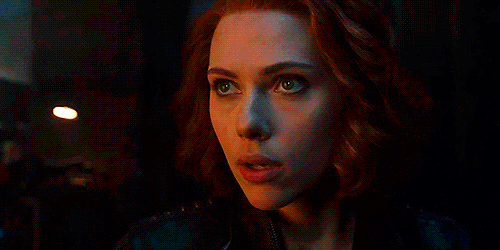
Natasha was exhausted.
It had been ten hours of this. On and off
Mostly on, and you, well you were not cognizant.
——
The redhead had mistakenly read one of Tony's world record books, it was a gag that he childishly bought. In the section dedicated to fornication she had read that the longest "episode of sex" to have been recorded, with no change in intimacy partners, was five hours long. So of course, Natasha Romanoff, the competitive devil, took the challenge on to double it, ensuring that no one (human-wise) ever beat her record.
You knew when you met her on the battlefield that she was an overachiever. It was the way that she had been graceful the entire time she choked the enemy with her beefy, as well as soft, thighs. To the now, where she fell beside you with an arm that held no functionality. All of the adrenaline faded and she huffed a tired chuckle.
What a night it had been she mused within the hollow confines of her dimming mind. Though sore she was able to get out of bed and work to clean you up. The moment you two had hit hour eight you were snoring. Natasha admired the way your body convulsed with every sleep time orgasm, even if you couldn't feel it, you were having the time of your unconscious life.
The you of the morning will be gobsmacked and in some way turned on. Your vagina that should be in ruins would likely pulse with a sharp, painful need. For now though she settled your core beneath a pair of fresh panties and slipped you up the bed and onto the pillows that were designed for you. Then she cleaned up the room of any evidence. She took the toys down to the small, second kitchen you had and tossed them into the designated dishwasher. Then she finished off the tray of peanut butter sandwiches she'd made for the nights necessary fuel station. She also had vodka, and an assortment of chocolate and fruit to munch on.
The rules of the book stated that breaks that lasted less than three minutes were ebbed into the flow of things.
Natasha was terrified to let you down, and by you she meant her very annoying sense of pride. Which is why the night started off with you in the captains position. Your soft lips painted her skin a lovely blend of maroon and lilac, the blue to forge a galaxy would come later.
The way she mewled for you felt pornographic, and then you remembered she had planned to record this for proof. You shakily agreed so she set up five cameras around the room. At each two hour mark when she stopped to drink some water or bite into a peanut butter sandwich she'd stop the one and start the other when she was back. Each clip got a different angle, each with their own feature and timestamped to the second to further prove the breaks weren't prolonged.
Natasha nearly killed you when her knees locked behind your head; but you didn't mind. You whispered a prayer against her pussy that she'd hopefully find you in paradise one day, then she came with a miracle on the dancing tastebuds of your tongue. Oxygen filled your lungs just as it excavated hers, the both of you spluttered as you choked on her slick, and she forgot how to breathe in place of the dizzying pleasure.
Thirty minutes down, but you were far from tired. It showed in the wild irises Natasha's soft emeralds met. Whenever you looked at her like that she lost all of her sense of authority. You'd flipped her over and fingered her while backhanding and palming at her smooth ass. Natasha grunted at each slap then moaned at the thrusts, it was husky and made your body tremble.
Natasha chased every single high you offered her, and she was near to losing count when you slowed down. You'd made it to hour three, and that's when the need to rest began to set in. Natasha saw it, and flipped you over so she could take over. You'd lasted longer than anytime before in one straight session and she was so incredibly proud, but more importantly turned on.
"Fuck Y/N," she panted against your cheek as her fingers slid through your slick folds. "You made me cum eight times and my pussy is still throbbing as you moan in my ear." Her lips lowered further, hot breath tickled your ear and you giggled breathily. "Keep going my sweet girl, you're in for a long night so keep it up."
You did your best too, entertaining her with answers to her filthy questions, moaning and thrashing as she found a new way to get you to your new best orgasm, but then your lethargy began to set in once again.
At hour six Natasha had sat your limp form up and nourished you back to life within the time constraint. Offering you a bit more enjoyment before the eventual KO took place. Your cries turned into whimpers, then choked moans until the sound of skin slapping and slick sliding was all she could focus on as she thrusted.
There was no time to feel any aches when focusing on keeping your body mindlessly jolting so Natasha built up her mental walls and in the long run gave herself carpal tunnel. In the end she felt it was worth it, as she won the fictitious title of "longest sex (love making) session ever recorded," and then she found you three days later after coming home early (at midnight as opposed to 7am) with your fingers inside you as your eyes were transfixed on her head between your legs.
"Wanna make a new record?" You jumped up and held your slick hand out in front of you to stall her request from happening, but all the redhead did was lunge and take your fingers into her greedy mouth. She moaned at the uniquely tangy taste, but her eyes creased in contradiction as your slivered nail scraped her palate.
"I need to taste you," she grunted and you gasped, "Natasha baby please." She shushed you with a bruising kiss and rubbed your cunt against her latex suit. You choked on her tongue and she chuckled, "It's okay detka, you can admit that you need me, I'm here."
"I'm sensitive," you whimpered and she kissed the bridge of your nose in comfort. "I'll be gentle detka, I just want to spend four hours talking to your pussy. Gonna tell you all the reasons why I love you while your moans convey the same message back to me."
"Please," you were breathless now and this time you were beckoning her closer instead of away. She pecked your lips then pulled away abruptly to keep her focus on a shower, while also making you stumble. "Get on the bed with nothing on detka, keep your hands to yourself and sit pretty while I take my quick shower."
"Be fast mommy," you cried and she cackled as the door shut, showing you her intentions to edge you.
You smirked, excited that your plan had worked, much unlike your legs would come morning; Natasha would now likely spend the entire week at your beck and call.
In the end, everyone wins.
Well, except for Tony, who had to fork out the cash for sound proofing the walls and sending Steve to therapy.
#natasha romanoff#natasha romanoff smut#natasha romanoff blurb#natasha romanoff imagine#natasha romanoff fluff#natasha romanoff fanfic#natasha romanoff x reader#natasha romanoff x you#natasha romanoff x y/n#natasha romanoff x fem!reader#natasha romanoff x female reader#gxg#natasha x reader#natasha x y/n#natasha x you#natasha x fem!reader
895 notes
·
View notes
Text
So I calculated the exact screen time of all the love square ships in season 1
Yeah, it's exactly what it says. With 99% accuracy I went through all the episodes of season 1, calculated the exact screen time of ever love square ship in every episode, added them all up and made charts to compare them.
But first of all, where did I get the idea to do this? Well, I was looking through Tumblr and I so a post by someone called purrincess-chat answering an ask about Adrienette in Season 5 and in her reply she mentioned how Ladynoir and Adrien have around the same screen time in seasons 1-4 with Ladynoir having slightly more and that is simply reversed in season 5 with some Maricat and Ladrien sprinkled here and there. So that made me wonder: how much really is the distribution of screen time between the love square ships? So I did this, starting with season 1. But before we get into the results...
Some Ground Rules
What does and doesn't count as screen time for a particular ship? Here are the rules I laid out:
Both characters of the ship must be present in the scene for it to count. That's means no scenes of Marinette fawning over ads and pictures of Adrien or Adrien swooning over the fact that the love letter he found in "Dark Cupid" might be from Ladybug.
At least one of characters of the ship must be reacting to the presence of the other character for it to count or at least doing something together. We can't have Maribug and Adricat both just doing their own separate thing acting like background characters and call that shipping content.
If one or both of the characters believe that there are speaking with the alter ego of the other character, then it counts as screen time for that ship. Meaning when Ladybug goes to check on Adrien in "Volpina" and Cat Noir pretends to be his civilian self taking a shower, it counts as Ladrien screen time, not Ladynoir.
Now that that's dealt with let's get into the distribution.
Screen Time Distribution
To the surprise of absolutely no one, Ladynoir dominated season 1, having 76% of the total love square screen time. Makes sense, right? There's an akuma every episode so there's Ladynoir ever episode and since this is season 1, it's more focused on the strict formula rather than some actual development between the other ships.
Coming in a definitely-not-close second is Adrienette with 18.5% of the total love square screen time. No surprises here. Adrienette along with Ladynoir are the main 2 ships while Maricat and Ladrien are simply the side ships. Plus, it's not often for just one of them to be transformed.
Speaking of which, Maricat and Ladrien come in 3rd and 4th with 3% and 2.5% of the total love square screen time respectively and pretty close to each other, Maricat having a slight edge over Ladrien.
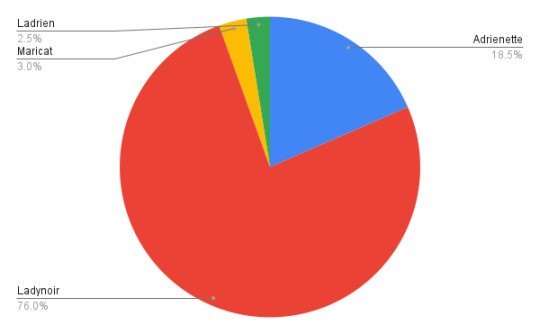
Now let's see the trend across the episodes.
Screen Time Trend
For the most part, Ladynoir is on a completely different level than the other ships, only temporarily being dethroned for one episode- that episode being "Gamer"- by Adrienette which was the episode they both practiced for the Ultimate Mecha Strike Tournament and we got some Adrienette bonding with Marinette giving Adrien her lucky charm bracelet. Other than that, it's been on top the whole time, with there even being episodes with solely Ladynoir screen time and having an average of 4 min 22 sec of screen time per episode, with most screen time being in "Animan" (8 min 28 sec) and least being in "Pixelator" (1 min 3 sec) a.k.a the episode where Adrien was stuck in the titular villain's prison dimension for most of the episode. It mellowed down a little towards the end of the season due to there being more plot relevant stuff in those episodes than akuma battle but picked itself right back up for the finale.
Adrienette stayed fairly low in screen time and having screen time in most episodes having a huge spike in the episodes "Kung Food" to "Animan", even temporarily dethroning Ladynoir like I mentioned before with 6 min 28 sec of screen time.
Finally, Maricat and Ladrien had a few small to moderate spikes here and there with some even being two episodes in a row and Ladrien having most of it's screen time towards the end of season 1.
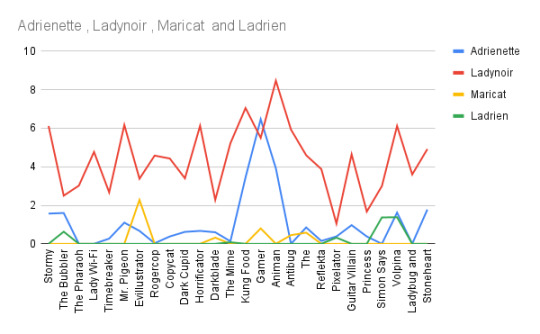
Conclusion
Yeah, so that's it. I'm going to be doing these after I complete every season so keep a look out.
450 notes
·
View notes
Text
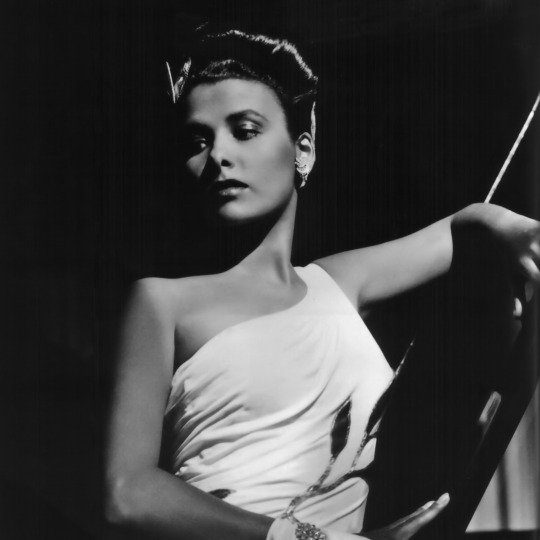
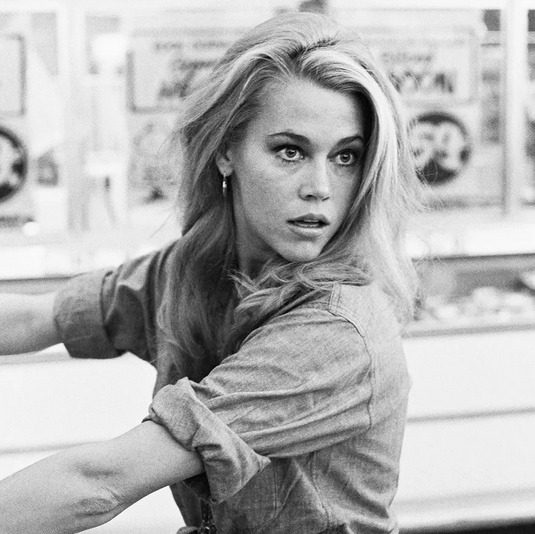
Propaganda
Lena Horne (Cabin in the Sky, Stormy Weather)— Incredibly talented biracial actress, singer, dancer, and activist (she did so much work towards integrating audiences). Because of the racism of the era, she rarely got to be the lead actress but filmmakers loved her so much that they would often create stand alone segments within a film to highlight her beautiful singing, knowing that these segments would ultimately be cut from the film by censors in areas that forbid films with Black performers. Also, she's just so wonderful in Cabin in the Sky as a gold-digger villain who is not the least bit subtle about her intentions. I would highly recommend checking out her work.
Jane Fonda (Barbarella, Sunday in New York, Barefoot in the Park)—Feminist icon, LGBTQ+ rights activist since the 70s, Civil Rights and Native American rights advocate, environmentalist… she really is THE woman ever
This is round 4 of the tournament. All other polls in this bracket can be found here. Please reblog with further support of your beloved hot sexy vintage woman.
[additional propaganda submitted under the cut.]
Lena Horne:
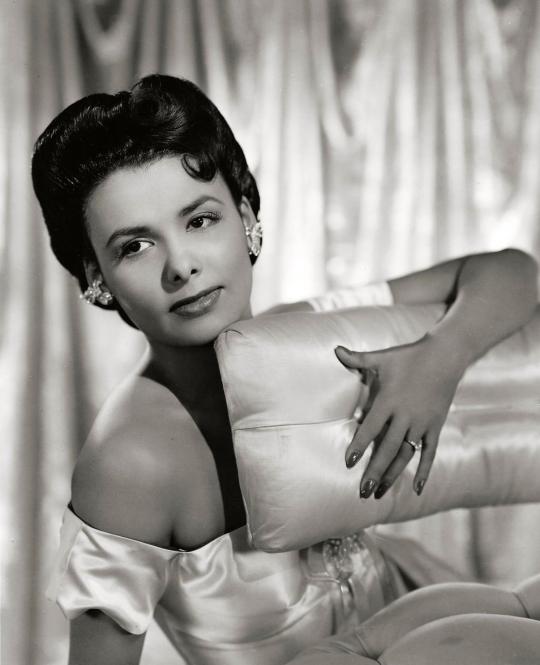
Black American powerhouse singer and actor who faced all the usual bullshit that any BIPOC faced in vintage Hollywood and achieved legendary status anyway. Also a Civil Rights movement icon.

She was a gem
She was so beautiful and those dimples are amazing! Truly depressing how badly Hollywood treated her because she was black. I would love to have seen what she really could have been if they didn’t cast her in so many yikes roles. She’s got gorgeous eyes and that body! Her joyful smile makes happiness sexy!
youtube
Civil rights actress, singer, dancer, actress, she's got the whole package
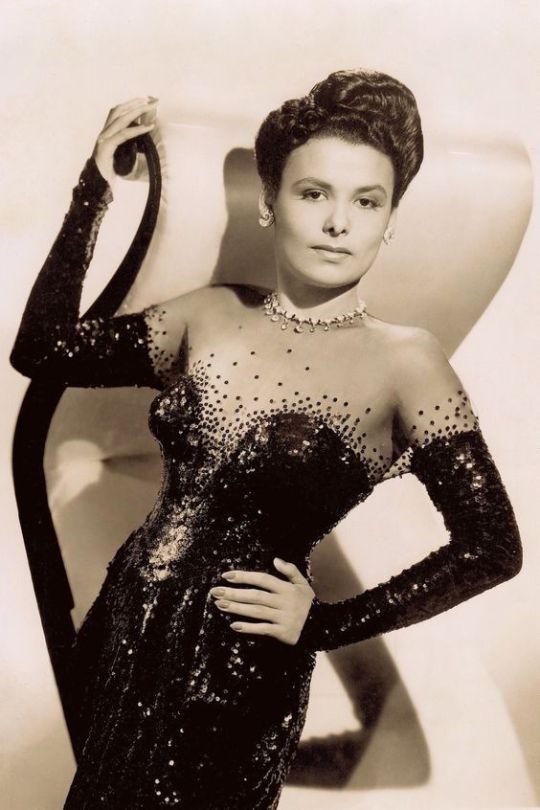
Lena Horne was a wonderful singer and actress who largely starred in black cast musicals. While she had a lot of main stream success, she ultimately lost the lead role in showboat (a role she had played on the stage) to a white actress due to hollywood's prejudices. She was also blacklisted during the HUAC hearings, but she still managed to be hot be hot as fuck and have a career spanning decades, working with more well-known stars like Judy Garland in musicals, and working on stage and releasing albums when her hollywood career began to suffer.
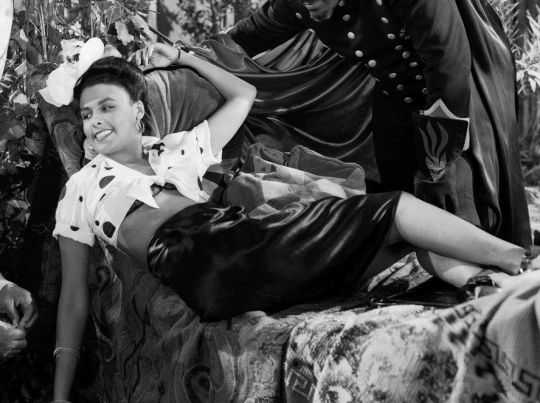
Miss Horne became famous during a period of time when Hollywood had very few meaningful roles for people of color. Although she is more so known as a performer, she starred in two successful all black productions (Cabin in the Sky & Stormy Weather). If that wasn't enough, she also guest starred on the Muppets (Season 1, Episode 11)

Jane Fonda:

" I assume she's already been submitted but I gotta make sure. I think there's an element to movies like Barbarella or her segment of Spirit of the Dead of those having been directed by her husband, who famously made movies about her being hot, and the incredible costume design also helped, but good lord. Look at her"

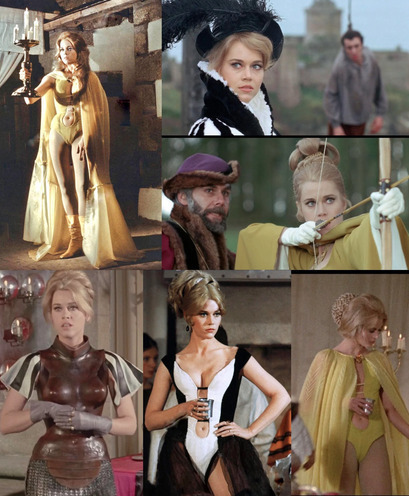
"She was so pretty, dear lord! She was and still us stunning. She’s great at comedy and drama."
"Shes so hot im so gay for me i will let her hit me with hers car"

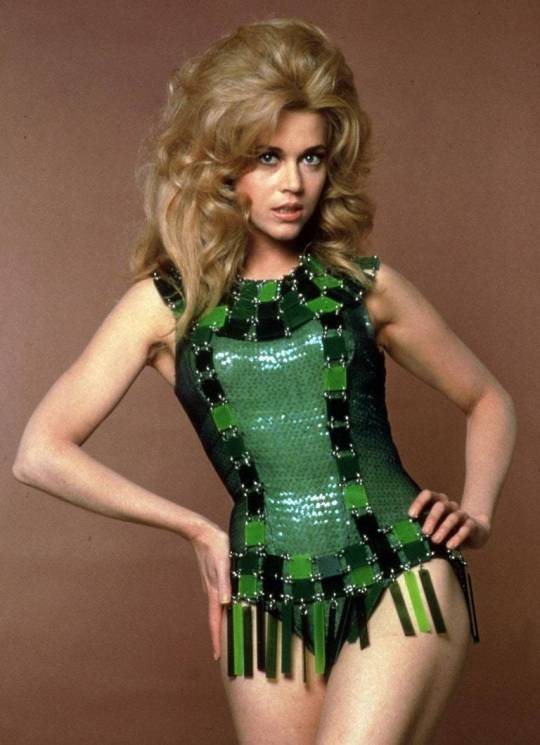
"Gorgeous and also still getting arrested at climate protests, which is sexy behavior"
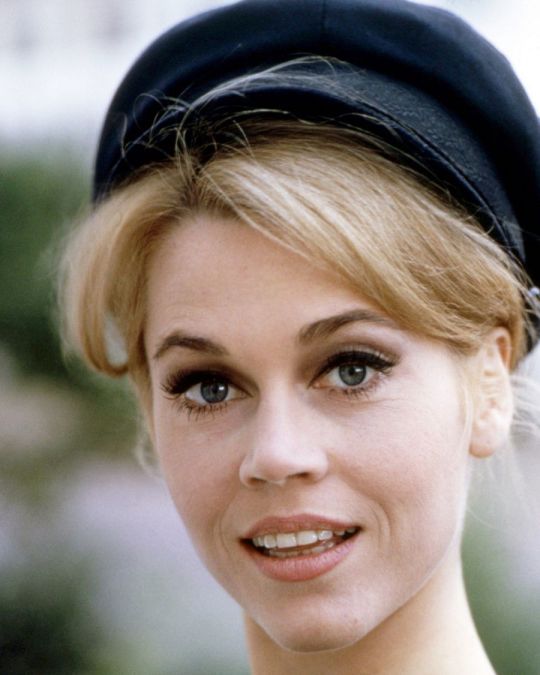
"Watching her in Barefoot in the Park seriously made me, a straight woman, question things"
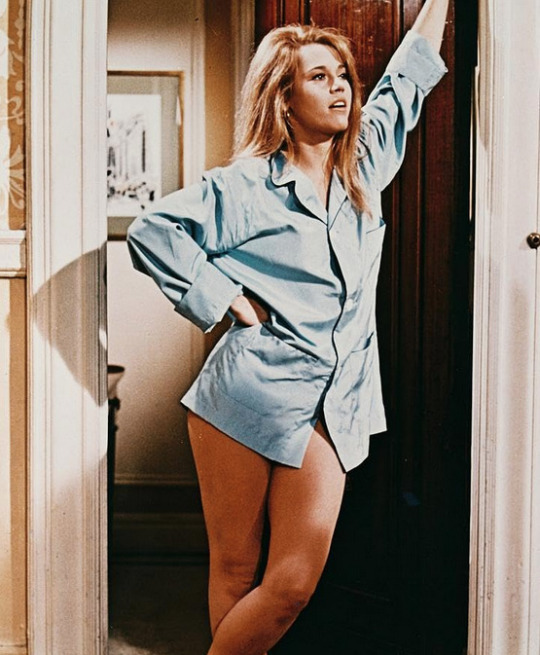

"PLEASE I LOVE HER SO MUCH"
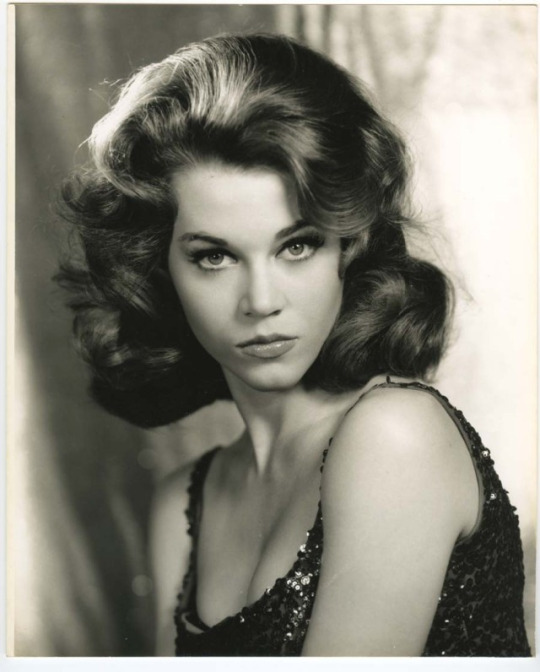
"Her vibes in these movies are so interesting because she, the daughter of an Old Hollywood star, went on to make both poignant dramatic movies and the some of the silliest things you've ever seen but even in the silly space adventures and sexploitations there's always this undeniable gravitas to her. It's like she's able not to take herself very seriously but at the same time never stops having this grace and elegance and makes it all work together. And she's always been very politically active which is also sexy. Her famous mugshot is from 1970 so right at the cutoff mark but come on"
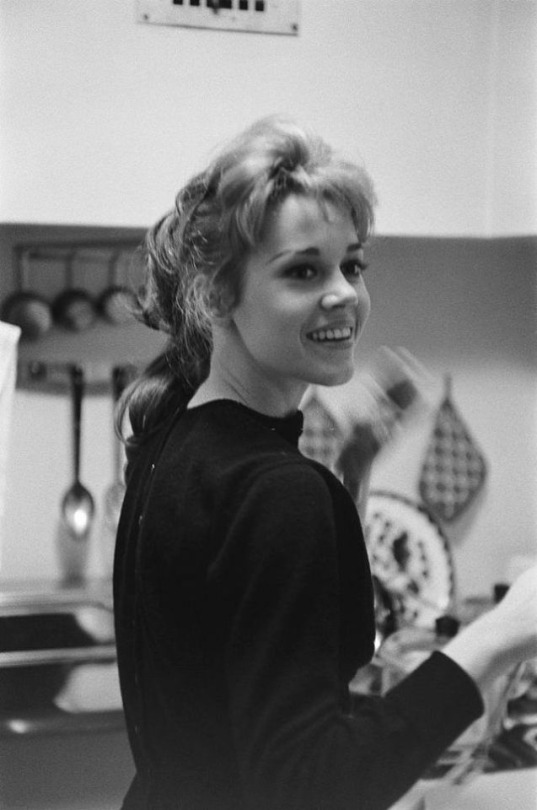
222 notes
·
View notes
Text
Ultimate Incest Tournament - Round 2


Propaganda under the cut:
Hikaru/Kaoru:
notable for actually leaning into the incest thing because twincest was their entire schtick while working at the host club
the twincest ship that defined a generation. taking the bait seems obvious when their performance gimmick for club guests is to fawn over each other and play up the affection tenfold, but it just gets better when you learn that for most of their lives they didnt have other friends and really only had each other until joining becoming members of the host club. so on top of being willing to flirt in public for attention, they're also codependent as hell <333
They're twins. They sleep in the same bed. They pretend to be in forbidden love to bait fujoshis but are maybe also in forbidden love for real. They were in high school before they met a single person who could tell them apart. They were devastating to my middle school psyche
Rick/Morty:
INCEST ICONS!! They've somehow got a MAJORITY of their fans on one of the most popular shows on TV to root for a guy who is CLEARLY sexually abusing his grandson ~subtextually~, but also sometimes ON SCREEN, and it's hilarious and fucked up, and Morty would kill anyone who tried to take his grandpa away <3
they're codependent in so many universes, they've gotta be fucking in a few
They get married!!!!! It's right there!! I wish I had more coherent thoughts about them but just. They. It's awful. It's abusive. It's twisted and cruel. It's a comedy duo. It's the best thing either have going for them. Rick will never fully respect Morty. Morty will never fully respect Rick. I want them to run away together. They're Something
the power dynamic is crazy! Morty's deeply lonely at the start and his grandfather takes advantage of that, rick pulls the kid out of bed, out of school, whenever he wants and gets him to do whatever he wants, covers up their activities, threatens and endangers and inflicts pain upon morty with intent and cruelty. he shapes morty according to his needs, the entire show is about the space adventures of an old man and his 14 year old grandson and you just gotta wonder, isn't it fucked up that this guy's sidekick and best friend and life partner is a kid? and it is!
Since morty is traumatized on the daily rick sometimes takes his memories, he controls what morty can remember (and therefore who he gets to be), the memory gun is just sci-fi gaslighting i say. and there's transdimensional travel and at one point it's revealed that ricks from different dimensions work together to "breed" mortys, ensure they're born (clone a bunch of them too) because a morty by nature is loyal and forgiving and makes the perfect partner that's easy to manipulate, easy to use. i will forever think of the "bred for forgiveness" line as perverted horrifying incest bait<3
Also one time they were hosts for alien parasites and they fell in love and made out and in the Very First episode rick gets morty to stick giant seeds (that rick needs for an experiment or smth) up his ass to smuggle them through security. they had some kind of dragon soul bond orgasm together. my point is it's borderline incestuous abuse and it's crazy that they imply these characters are tied together cosmically.. if they are it's rick holding their red string of fate like a leash
they are together (sometimes romantically/sexually, sometimes not explicitly so) in EVERY universe there is canonically a club on the citadel called The Creepy Morty. Miami Morty has an R tattooed on his asscheek they love each other they hate each other they cant stand being together they cannot be separated Rick loves grooming Morty. like. he has literally pushed Morty into comitting genocides and conditioned him into becoming desensitized to all kinds of sexual and violent things. Rick keeps a memory vial of Morty's entitled "virginity" Rick C137 (the main one in the show) has sacrificed his life to save Morty
#tumblr polls#tournament polls#incest poll#hikaru/kaoru#ouran high school host club#rick/morty#rick and morty#incest tw#round 2
110 notes
·
View notes
Text
Tumblr Dr. Who Poll vs Doctor Who Magazine Poll
It's been just over a month since the end of @adventure-showdown 's monumental survey of how Tumblr feels about individual Doctor Who adventures. Across ten rounds, we sorted the wheat from the chaff, the Quarks from the Rills, and the Cousins from the Looms. I wanted to compare the results of that huge bracket with the results from last year's Doctor Who Magazine poll, which ranked each Doctor's stories individually.
The methodologies for these two were quite different (though adventure-showdown did seed the bracket with a pre-poll that used the same methodology as DWM, but I'm looking at the final poll results for my data here), so comparing them is really interesting! I'm not a statistician, I just like making spreadsheets for fun. I think what can be seen from the trends and data below is a really unique picture of two somewhat overlapping but seriously demographically distinct fragments of the fandom.
Methodologies
Poll Methodologies
The DWM poll asked readers to rank as many televised Doctor Who stories as they liked from 1 to 10. The editors then took the resulting scores for each story and put them in a ranked list for each Doctor.
adventure-showdown began with a series of Google Forms with the same method as DWM, asking internet users to rank stories from 1 to 10. adventure-showdown lumped and split stories differently to DWM: The Key to Time was included as a distinct Four story to each of its individual parts, and each of the individual parts of Trial of a Time Lord and Flux were included alongside the overarching story. Utopia was also split from The Sound of Drums/The Last of the Time Lords.
adventure-showdown used the resulting rankings to create a series of Tumblr polls, moving from a group stage into a series of head-to-head matchups. They matched stories up roughly by obscurity (keeping advertisements and musical numbers separate from audio dramas and comics, which were separate from TV spin-offs, which were separate from the TV show itself), then Doctor or era. With each new round, the matchups were scrambled within melded groups, which ultimately led to a diverse distribution of all different eras and media under the umbrella of Doctor Who throughout the tournament.
My Methodology
In order to turn adventure-showdown's poll results into something that can be compared to DWM's, I created a spreadsheet tracking how each Doctor's stories were doing, separating them first into tiers according to which round they were eliminated in, then within those tiers by how many votes they had in the matchup where they were eliminated.
In the case of some particularly tough matchups, this means that the story that got the most points throughout the entire competition is not necessarily the highest-ranked story for that Doctor. For instance, The Happiness Patrol finished #3 of the Seventh Doctor's stories according to my reckoning of the Tumblr poll, being eliminated in the fifth round with 400 votes, less than the two stories above it (which were eliminated in rounds where they got 147 and 107 votes, respectively). The Happiness Patrol saw a vigorous campaign to increase its vote count, since it was up against Blink. The post for the matchup that eliminated it currently has 304 notes as of this writing. This is one of the fun quirks of this execrise.
General Trends
Where We Agree

The Ninth Doctor shows very stable story rankings between DWM and Tumblr.
On average, the difference in rankings for each episode of 9 is 5%, with only 2 out of 10 stories actually moving up or down the rankings at all. The Sixth Doctor is similar: only 3 of his 8 stories (included in the DWM poll, meaning not counting the individual parts of Trial) moved by more than 1 ranking. The Seventh Doctor only had 4 of his 12 stories move by more than 1 ranking.
On the flipside, Tumblr's opinions differ from DWM most regarding the First, Fifth, and Eleventh Doctors. The only stories that stayed relatively stable across both rankings for these Doctors are as follows.
For the First Doctor, only 4 out of 29 didn't shift by more than 1 ranking: #2 The Time Meddler, #5 The Tenth Planet (#6 in DWM), #18 The Keys of Marinus, and #20 The Reign of Terror (#19 in DWM)
For the Fifth Doctor, we agreed only 5 times out of 20: #1 The Caves of Androzani, #2 The Five Doctors (#3 in DWM), #11 Frontios, #14 Black Orchid, and #17 Arc of Infinity (#16 in DWM)
For Eleven, 5 of his 39 stories stayed relatively stable: #1 Vincent and the Doctor (#2 in DWM), #4 The Eleventh Hour (#3 in DWM), #9 Amy's Choice, #14 The Snowmen (#13 in DWM), and #39 The Doctor, the Widow, and the Wardrobe.
As you'll see further below, there is usually agreement between both polls about at least one episode that is in the top and bottom 3 or 4 for each Doctor, so these extremes represent the battle over ordering the ones generally ranked in the middle.
We Hate Daleks
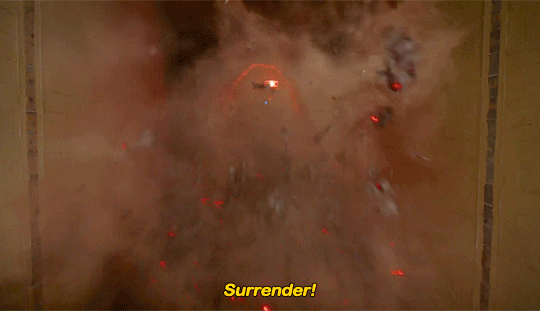
As a general trend, Tumblr seems to think less of Dalek stories than the general DWM readership.
Out of 26 stories with Daleks as the primary antagonist, only 8 did not drop by more than 1 slot between the DWM poll and the Tumblr bracket (that is The Chase, Genesis of the Daleks, Remembrance of the Daleks, Dalek, Bad Wolf/The Parting of the Ways, Daleks in Manhattan/Evolution of the Daleks, The Magician's Apprentice/The Witch's Familiar, and Eve of the Daleks). DIM/Evolution actually ranked 3 slots higher on Tumblr than the magazine, while TMA/TWF and Eve finished significantly higher on Tumblr than in the magazine, cracking into the top 5 for their respective Doctors.
We Love The Master
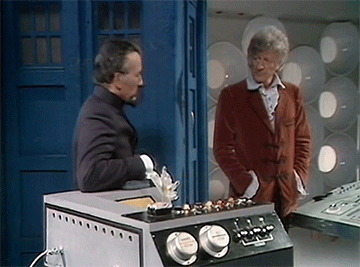
Meanwhile, out of 26 stories featuring the Master, either as the primary antagonist or as an important character, only two dropped by more than one place in the rankings (The End of Time and The Power of the Doctor), while the others either stayed put or increased their positions, some by quite a lot (e.g. The Time Monster (up 20 slots in the Third Doctor rankings), The Keeper of Traken (up 8 slots in the Fourth Doctor rankings), Planet of Fire (up 6 spots in the Fifth Doctor rankings), and The Magician's Apprentice/The Witch's Familiar (up 9 spots in the Twelfth Doctor rankings)).
We Have No Easily Observable Feelings About the Cybermen
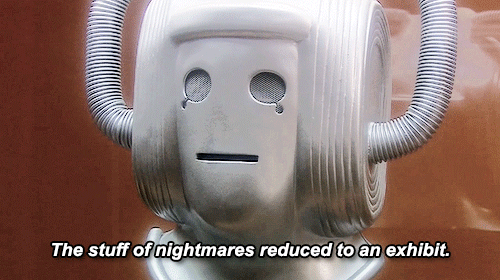
Out of 18 Cyberman stories, 9 fell in the rankings between DWM and Tumblr, while 5 stayed within 1 rank of the DWM poll, and 4 rose. If I had to venture a hypothesis based on my unscientific qualitative analysis, it looks like Tumblr marked down most of the Classic Who Cyberman stories (only The Tenth Planet, The Invasion, and Attack staying within 1 rank of the DWM poll), while the only ones that rose in the ranks were New Who stories (Rise/The Age of Steel, Closing Time, Nightmare in Silver, and Dark Water/Death in Heaven-- though of course this last one is also a Master story, which we know we love).
Superlatives
Here are the stories that showed the biggest positive and negative difference in their rankings between the DWM poll and the Tumblr bracket, for each Doctor:
First Doctor

Biggest jump: #10 The Sensorites (up from #27 in DWM)
Biggest fall: #28 The Crusade (down from #13 in DWM)
Second Doctor
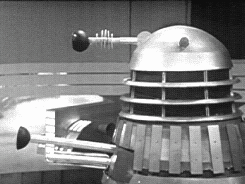
Biggest jump: #8 The Highlanders (up from #16 in DWM)
Biggest fall: #14 The Evil of the Daleks (down from #14 in DWM)
Third Doctor

Biggest jump: #4 The Time Monster (up from #24 in DWM)
Biggest fall: #21 Day of the Daleks (down from #11 in DWM)
Fourth Doctor
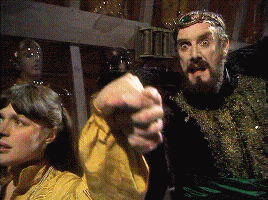
Biggest jump: #7 The Horns of Nimon (up from #40 in DWM)
Biggest fall: #36 The Talons of Weng-Chiang (down from #5 in DWM)
Fifth Doctor
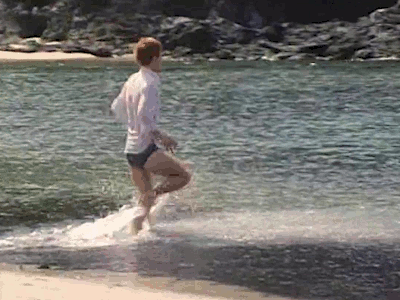
Biggest jump: #8 Planet of Fire (up from #14)
Biggest fall: #15 Resurrection of the Daleks (down from #6)
Sixth Doctor
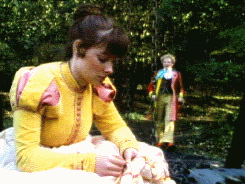
Biggest jump: #1 The Mark of the Rani (up from #5 in DWM)
Biggest fall: #6 Revelation of the Daleks (down from #1 in DWM) [NB: not counting each part of Trial, since DWM didn't include them - though The Ultimate Foe ranked #10 on Tumblr while Trial itself ranked #4 in DWM, so that could be another option for this superlative]
Seventh Doctor
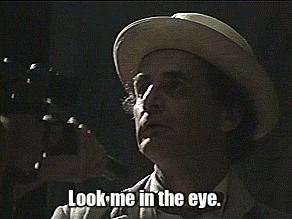
Biggest jump: #3 The Happiness Patrol (up from #7 in DWM)
Biggest fall: #12 Silver Nemesis (down from #9 in DWM)
Ninth Doctor

Biggest jump: #5 The End of the World (up from #7 in DWM)
Biggest fall: #7 Rose (down from #5 in DWM)
Tenth Doctor

Biggest jump: #17 42 (up from #31 in DWM)
Biggest fall: #29 The Girl in the Fireplace (down from #7 in DWM)
[NB: adventure-showdown split Utopia and The Sound of Drums/Last of the Time Lords where DWM didn't, which both placed above these two stories.]
Eleventh Doctor

Biggest jump: #13 The Rings of Akhaten (up from #34 in DWM)
Biggest fall: #36 The Crimson Horror (down from #18 in DWM)
Twelfth Doctor

Biggest jump: #20 The Eaters of Light (up from #30 in DWM)
Biggest fall: #18 The Zygon Invasion/The Zygon Inversion (down from #7 in DWM)
Thirteenth Doctor

Biggest jump: TIE #1 Demons of the Punjab (up from #5), #2 Spyfall (up from #6), and #3 Eve of the Daleks (up from #7)
Biggest fall: #15 Rosa (down from #4) [NB: not counting each part of Flux, since DWM didn't include them - though The Vanquishers ranked #29 on Tumblr while Flux itself ranked #12 in DWM, so that could be another option for this superlative]
Definitive Bests and Worsts
Here, then, are each Doctor's commonly agreed-upon best and worst stories: that is, those stories ranked in each Doctor's top/bottom 10% (minimum 3) in each poll, and where both polls overlap. Lists are alphabetical.
First Doctor (top/bottom 3)
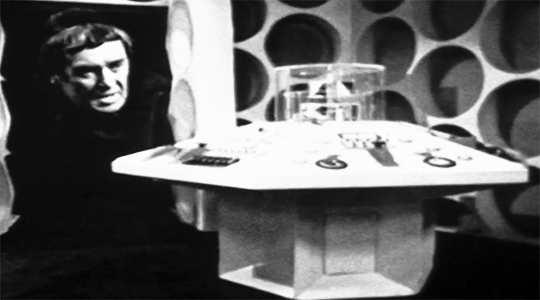
Best
Both agree: The Time Meddler
Tumblr: The Edge of Destruction, The Romans
DWM: The Dalek Invasion of Earth, The Daleks' Master Plan
Worst
Tumblr: The Crusade, The Savages, The Smugglers
DWM: The Sensorites, The Space Museum, The Web Planet
Second Doctor (top/bottom 3)

Best
Both agree: The War Games
Tumblr: The Enemy of the World, The Mind Robber
DWM: The Power of the Daleks, Tomb of the Cybermen
Worst
Both agree: The Dominators, The Space Pirates
Tumblr: The Krotons
DWM: The Underwater Menace
Third Doctor (top/bottom 3)

Best
Both agree: The Green Death
Tumblr: The Dæmons, The Three Doctors
DWM: Inferno, Spearhead from Space
Worst
Both agree: The Mutants
Tumblr: Death to the Daleks, Planet of the Daleks
DWM: The Monster of Peladon, The Time Monster
Fourth Doctor (top/bottom 4)
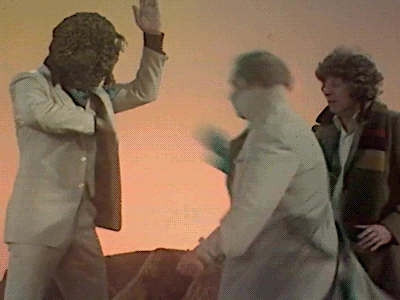
Best
Both agree: City of Death, Genesis of the Daleks, Robots of Death
Tumblr: The Horror of Fang Rock
DWM: Pyramids of Mars
Worst
Both agree: The Power of Kroll, Underworld
Tumblr: Nightmare of Eden, Revenge of the Cybermen
DWM: The Horns of Nimon, Meglos
Fifth Doctor (top/bottom 3)
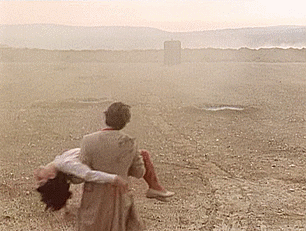
Best
Both agree: The Caves of Androzani, The Five Doctors
Tumblr: Enlightenment
DWM: Earthshock
Worst
Both agree: Time-Flight
Tumblr: The Awakening, Four to Doomsday
DWM: The King's Demons, Warriors of the Deep
Sixth Doctor (top/bottom 3)
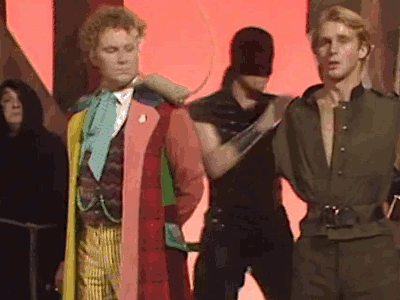
Best
Both agree: Vengeance on Varos
Tumblr: The Mark of the Rani, Trial of a Time Lord (considered as a whole)
Worst
Both agree: Timelash, The Twin Dilemma
Tumblr: The Ultimate Evil (specifically)
DWM: Attack of the Cybermen
Seventh Doctor (top/bottom 3)

Best
Both agree: Remembrance of the Daleks, Survival
Tumblr: The Happiness Patrol
DWM: The Curse of Fenric
Worst
Both agree: Delta and the Bannermen, Time and the Rani
Tumblr: Silver Nemesis
DWM: Paradise Towers
Ninth Doctor (top/bottom 3)
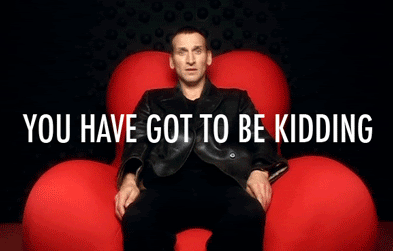
Best
Both agree: Bad Wolf/The Parting of Ways, Dalek, The Empty Child/The Doctor Dances
Worst
Both agree: Aliens of London/World War Three, Boom Town, The Long Game
Tenth Doctor (top/bottom 4)

Best
Both agree: Blink, Midnight, Silence in the Library/Forest of the Dead
Tumblr: The Fires of Pompeii
DWM: Human Nature/The Family of Blood
Worst
Both agree: The Idiot's Lantern, The Lazarus Experiment
Tumblr: The Next Doctor, The Shakespeare Code
DWM: Fear Her, Love & Monsters
Eleventh Doctor (top/bottom 4)

Best
Both agree: The Eleventh Hour, The Pandorica Opens, Vincent and the Doctor
Tumblr: The Doctor's Wife
DWM: Day of the Doctor
Worst
Both agree: The Doctor, the Widow, and the Wardrobe
Tumblr: The Crimson Horror, Night Terrors, Victory of the Daleks
DWM: The Curse of the Black Spot, Journey to the Centre of the TARDIS, Nightmare in Silver
Twelfth Doctor (top/bottom 4)

Best
Both agree: Heaven Sent, Mummy on the Orient Express, World Enough and Time/The Doctor Falls
Tumblr: The Husbands of River Song
DWM: Flatline
Worst
Both agree: In the Forest of the Night, Kill the Moon, Sleep No More
Tumblr: The Lie of the Land
DWM: The Woman Who Lived
Thirteenth Doctor (top/bottom 3)

[Villa Diodati gif included because there is no overlap in the two polls' top 3 for Thirteen, however this episode ranked #4 on Tumblr and #2 in DWM, so it is the closest overlap at the top.]
Best
Both agree: None!
Tumblr: Eve of the Daleks, Demons of the Punjab, Spyfall
DWM: Fugitive of the Judoon, The Haunting of Villa Diodati, The Power of the Doctor
Worst
Both agree: The Battle of Ranskoor Av Kolos, Orphan 55
Tumblr: The Vanquishers (on its own)
DWM: Legend of the Sea Devils
...What about Eight?
Who said that? I thought you had all gone. You shouldn't scare me like that. Well, you see, the Eighth Doctor only has two televised appearances in which he features, and only one of those was included in the DWM poll. This post is about comparing the two polls. I can't really do anything...
Ah, alright.
Televised Appearances
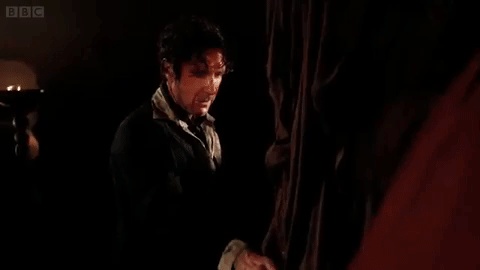
We ranked The Night of the Doctor above the TV Movie. Night made it all the way to round 6, while the TV Movie was out in Round 2, losing with 266 votes to Jubilee, which then lost to Scherzo in the next round. Night lost to Bad Wolf/The Parting of the Ways, which had 344 votes to Night's 204.
Audios

Scherzo made it to the quarter-finals of the Tumblr poll! It lost out to Midnight 435 to 581, the first TV episode it encountered in adventure-showdown's very intricate media-segregating bracket.
Caerdroia made it to round 7, losing to Scherzo after it had beaten out Father's Day in round 6 (299-280) and the much-loved SJA episode The Curse of Clyde Langer in round 5.
The Natural History of Fear made it to round 6, finally losing out to Blink (253-352), and making it the top-scoring Eight audio to go out in this round.
The Chimes of Midnight also got to round 6, finally just losing to Remembrance of the Daleks (163-166); in the same round, Zagreus lost to Scherzo (131-210) just after it had beaten Genesis of the Daleks (132-103) in round 5.
The next highest-ranked Eight* audio is Solitaire (a Companion Chronicle, hence the asterisk), which was eliminated in round 5, losing to Silence in the Library/Forest of the Dead (180-43).
It's worth noting here, that Doctor Who and the Pirates also made it to round 6, making it the highest-ranked non-Eighth Doctor audio. It lost to City of Death (170-78). The next-highest ranked audios are The Marian Conspiracy (lost in Round 5 to The Wedding of Sarah-Jane Smith), The Holy Terror (lost in Round 5 to The Empty Child/The Doctor Dances), and A Death in the Family (lost in Round 5 to The Natural History of Fear). Congratulations to Evelyn Smythe.
Novels
The EDA Alien Bodies managed to make it to round 6, finally being eliminated by Turn Left with 145 votes to 264. It had just beaten out Time Crash in the previous round. This makes it the highest-ranked Doctor Who novel overall, according to this Tumblr tournament.
The next-highest novel for the Eighth Doctor was Unnatural History, which was defeated in round 5 by The Chimes of Midnight.
Below that, there were five EDAs eliminated in round 4:
Interference (lost with 41 votes to Scherzo's 85)
Mad Dogs and Englishmen (lost with 38 votes to The Marian Conspiracy's 56)
The Adventuress of Henrietta Street (lost with 28 votes to A Death in the Family's 54)
Camera Obscura (lost with 27 votes to Lungbarrow's 47)
The Scarlet Empress (lost with 22 votes to The Chimes of Midnight's 102)
Comics
I hadn't actually been tracking any of this Eight stuff, so I'm having to squint through the backlog and this is already much too long. So you're only getting two: The Land of Happy Endings is the Eighth Doctor comic that made it the farthest in the Tumblr competition, being eliminated in round 3 by An Adventure in Space and Time (46 votes to 95). The Flood also made it to round 3, where it was eliminated by the Thirteenth Doctor comic Old Friends, gaining 39 votes against Old Friends' 47.
#doctor who#classic who#big finish#eighth doctor#jodie whittaker#thirteenth doctor#christopher eccleston#ninth doctor#many interesting things here#will reblog with analysis
116 notes
·
View notes
Text

✨🧪FINAL round of the Ultimate Rick and Morty episodes/ specials tournament!!!🧪✨
#rick and morty#rickandmortyepisodetournament#the rickshank rickdemption#unmortricken#round 5#final round
62 notes
·
View notes
Text
It’s a big day for kalos fans, let me ship post as a treat.
I love that pokemon masters keeps hinting and showing a glimpse past calems stoics, showing that he seems to have a thing for serena, which I cannot blame him- she is the human equivalent of a chantilly cake; a soft fluffy balance between sweet and fresh, elegant and sugary. She’s good at what she does and he respects her a lot for it even if he’s prone to self sabotage trying to get on her level (parental issues being raised by tournament veterans)



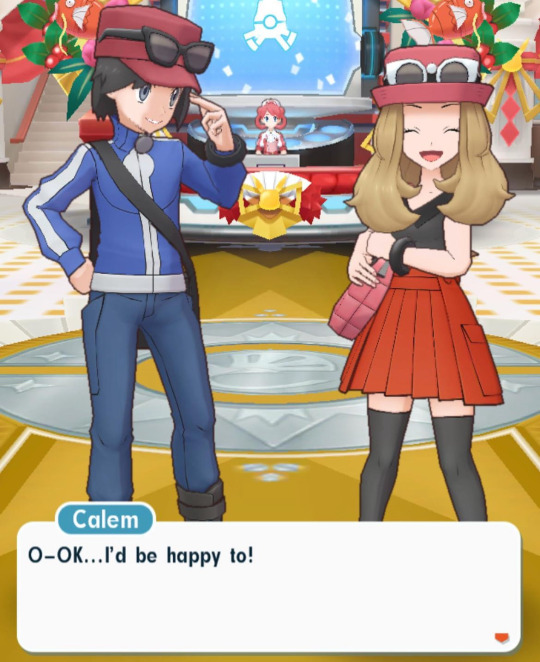
And it’s not just these moments, this dynamic is deeply embedded into their rivalry and shows in every iteration of their existence. The manga, the games, masters, and maybe even the legends Z game counterparts we will see next year-
in the manga Y (Serena’s counterpart) is the only member of their friend group who didn’t give up on X (Calem’s counterpart) when he shut himself away in a depressive episode, she tried to talk to him everyday, brought him food, and even in her frustration never gave up on him; and ultimately it’s her stubborn support that brings him back out of his shell in the end. In the games they’re bond is so dorky and precious- they tease each other, they bicker, they banter, they’re rivals through and through, but ultimately it boils down to one truth; they are both recklessly protective over one another in the face of team flare, and rivalry turns to teamwork, and they couldn’t have done it without each other.
There’s such a heavy emphasis on the mutual respect they hold, both wanting to better themselves for each other even though the other thinks of them so highly. Calem would utterly worship her if he weren’t so spooked by his own vulnerability, they both have struggles, but they both have a patient understanding of balance to work.
They balance each other. Cheerfully angelic and stoic aloofness, yet they understand each other wordlessly, work with muscle memory coordination, feel each other’s feelings. Much like life and death, happiness is found in balance.
If only they weren’t so oblivious to the way they treat each other like a romance novel.
#click alt text for my personal read on the dialogue#they are perfectly formed into their games themes#kalosshipping#pokémon xy#trainer calem#trainer serena#character study#headcanon break down#<- not actually a headcanon it’s my personal read#those are different things
92 notes
·
View notes
Text
Beyond that... I've been absolutely poisoned by weirdos and anime in general when so many top favorites of people are High School romances where it's some clueless basic looking guy who does almost jack shit but has multiple girls pining for him.
This trope, anime fanfiction video game, it irritates me. It skeeves me out.
Poly relationships are great! But there's a difference. Big fucking difference. When someone says "naw maybe they're poly!" but I know what it is, what that actual canon was to begin with. that's not poly... i smell the difference between poly and...
Male oriented fanservice. Generic hero gets a bunch of girls to flock to him like they were party members of Pokemon. It's just fulfilling a fantasy of being the "ultimate gigachad" by just having girls similar to property and by doing absolutely nothing to warrant it.
It's all the worst tropes in one:
forced romantic plots instead of normal everyday friendship
generic boring guy who's made to be the perfect blank slate
girls made to be different to fit various tastes and keep the audience watching aka fan service
girls putting in all of the fucking romantic work because "girls are the romantic ones while the guy focus on the action and 5 episode long battle/cooking/juggling bowling pins tournament arc" oh yeah and they get cheered on by his girls
"Oh that hero! once again being oblivious and dumb to romance and does nothing romantic in return! what a lovable dumbass!" This Man Is Going In The Trash
they will all bear his kids because that's also what girls are made for
i just feel bad for these girls like... girls. there's more fish in the sea. He Ain't It™
edit: it appeals to the avoidance of commitment and just having girls flock to someone without even trying. The kind of guy who idolizes this is the kind of guy I Hate. It's not love. It's collection.
60 notes
·
View notes
Text
The Ultimate Episode Tournament: Round 4 Match 7
19 notes
·
View notes
Text
What Helck Does Right That BNHA Is Doing Wrong
I wrote this out in a spate of frustration a while back, lost it, and then was able to recover it again, so in the interest of conservation, I figure I might as well share. It contains massive spoilers for Helck—details of its ending, its overarching plot, deep world secrets, and so on—so read at your own risk if you're one of the few people following the anime. On the other hand, very few people do seem to be watching Helck, so if you watched the first episode and then dumped it for being too goofy and comedic, this write-up will definitely give you some context for where that story goes.
(More people should read/watch Helck. Please read this and then go read Helck.)
(If you prefer, you can also just skim the Helck bits until you get to me complaining about BNHA’s crappy endgame. Hit the jump, either way!)
Helck: What It Does
For my readers unfamiliar with the series (e.g. probably most of you), Helck’s elevator pitch is, “After the Hero defeats the Demon King, the demons hold a tournament to select the new Demon King. But wait, why is there a human here?!” It’s riffing, obviously, on the foundational JRPG story, and starts out in a high-key goofy comedy mode, which, while representative of its sense of humor, is not actually very reflective of the tonal zone it winds up occupying for most of its run. The darkness and horror elements of the series are foreshadowed by the title character—Helck, the human who showed up to join the Demon King selection tournament—cheerily proclaiming that he hates and wants to destroy all humans. Something is very wrong in the human lands, it seems, and the main character—Vamirio, one of the Four Heavenly Kings of the demon empire, sent to oversee the tournament—uncovering and then responding to that wrong forms the bulk of the story.
That said, it takes a good long while for Helck to reveal the true nature of its conflict. While there are some key villainous figures that have been in play for long before that point, the ultimate truth is that the world of Helck contains a disembodied force that contacts people when they’re in their darkest, most despairing moments, providing them an “answer” for why their situations are so miserable and how to go about fixing the world that hurt them so badly, as well as power to help them do so. The answer given by this force, called “The Will of the World,” is twisted and omnicidal, but between a degree of implied mental influence and the timing of the approach, lots of otherwise innocent, hurt people can wind up becoming the figures behind literally world-threatening dangers.
Eventually, we find out that Helck himself was approached by The Will when he was a child in a bad situation. He wasn’t quite ready to give in yet—he had a kid brother to look out for—and so he powered past it, but it’s remained in the back of his head since that day, ever-ready to whisper its apocalyptic solutions to extreme class disparity and abuse. This gives him a degree of empathy for the villains of the series, even as they do extremely awful stuff that he can’t otherwise forgive.
In the epilogue, a new king is crowned and we’re generally assured that things in Helck’s country are going to improve from now on. The demons are developing magical treatment to reverse a once-thought-irreversible transformation from sentient person into mindless monster, preparing groups that will venture forth to find all the affected humans still wandering the countryside so that they can be helped. Helck himself could easily rest on his laurels, either settling in with the human friends he had to go to extreme lengths to save or accepting his demon friends’ invitation to come live with them, the ones who fought at his side and gave him hope when he was so often on the verge of despair.
But he does neither, because he knows that The Will of the World is still out there whispering to other people in pain—it’s a force of nature that will always be out there, until someday it succeeds at finding someone it can use to overturn and restart the world. It can never be killed, only circumvented. However, The Will can’t act on its own, only through those that have fallen under its sway, and those people don’t start out as raving, gleefully evil maniacs! They start out as people experiencing unconscionable suffering, because people suffering to that extent are the only ones who can be convinced to believe that the answer is total annihilation.
Helck knows better than to assume that simply installing one good king in one overall-good country will be enough to save everyone in the world—or even in that one country!—from despair, and he’s intimately familiar with what that despair is like. So, he packs up with one of his besties and they set out on a journey that will, implicitly, never really have an end. Of course, he’ll come visit his friends and loved ones from time to time, but what he’s really dedicating himself to is finding and rescuing other people, other victims, giving them reasons to hope, reasons to believe in the world as it is now, because, as he himself experienced, that’s the only thing that can really stop someone from falling prey to The Will of the World.
Saving those victims is a practical means of preventing all the harm they would have gone on to wreak, yes, but it also means said victims don’t have to be put to the sword when they turn up at the head of an army of monsters or some shit a few decades down the line.
Helck’s answer to the problem of recurrent, inevitable suffering is thus threefold:
Improve the system at large by clearing out the corruption on top.
Dedicate active, ongoing efforts to redressing the sins of the previous system and helping its victims, even if they seem too far gone.
Proactively seek out and bring aid to problem areas before the sufferers there metastasize into world-shaking dangers.
Its characters are involved in all three of those stages—the heroic side cast does Point 1, Vamirio and her allies handle Point 2, and Helck takes up the responsibility of Point 3. He goes out into the world to be that extra safety net when the better society he helped put in place inevitably still fails people, in places where his allies can’t reach. To find them—the people who are in such bad situations that apocalypse looks like a reasonable solution—he’s going to have to wade, personally, into the deepest and worst mires he can find, pulling people out of that darkness one hand at a time.
As a series, then, Helck believes in systemic change while also believing that systemic change will never be sufficient on its own to prevent all suffering. However, rather than then simply shrugging and accepting that suffering is inevitable and so the heroes will have no choice but to deal violently with the people who fell through the cracks when they inevitably return as dangerous villains, it sends its hero out to do that ground-level work of saving people. And he himself isn’t enough either, but his actions are still meaningful, because every life he saves is both that one soul saved from darkness, and one more vector cut off that could otherwise spiral into exponential amounts of suffering and death.
BNHA: What It's Not Doing
We can see an echo of the path into darkness which turns victims into villains in BNHA, where the villains are not Born Monsters, but rather become monsters because of the circumstances of their lives. The pain they endure, the discrimination and violence they face, leads them to their extremist reactions to try and repair—or simply destroy—a world they perceive as fundamentally hostile to them. While there’s no overarching Will of the World manipulating them for its own ends—All For One is akin to it in how he operates, but at the end of the day, he’s still just another man, not a literal planetary anima—the end result remains the same: people forged by suffering into enemies so dangerous and resolute that they threaten the entire foundation of the world as it currently exists, as well as all those who are living in peace and happiness in the current world.
So, when faced with the prospect of enemies who are an unavoidable consequence of the endurance of the status quo (because the status quo the heroes have chosen to support is full of discrimination and repression), what exactly is BNHA proposing to do about those enemies arising in the future? How will the heroes’ course of action regarding those enemies be different at the end of the story than it was at the beginning? Well, so far we’ve got:
Shouji functionally telling the heteromorphs at the hospital that all they can do is endure their suffering until the people around them decide on their own to improve.
Even as she’s embraced by a Hero, Toga believing there’s no possible ending in which she can reach a world she wants to live in, and so resigning herself to finding a satisfactory death instead.
The seeming resolution of the subplot concerning the civilians lashing out at the heroes for their failure being for them to collectively agree to support heroes even more, with no explanation of what that would change for the children out of view of a hero, like Tenko was, or being victimized by a hero, like Touya.
I feel like the manga wants us to believe that the future will be better because heroes as a group, inspired by the kids of 1-A and with the corruption of the HPSC purged, are going to be more empathetic towards villains as a group going forward. I don’t believe that, however, thanks to even the students’ (and especially Deku’s) continued willingness to completely ignore the humanity of the villains they don’t have pre-existing bonds with. Their empathy for “their” designated villains is admirable, certainly, and a good start on the necessary change, but it’s not sufficient if it starts and ends with that highly conditional empathy.
What is going to be different on a systemic level to help people like Toga or Spinner? What will change in society at large such that the average person on the street will become willing to help someone off-putting and potentially dangerous like Tenko or Jin? What overhaul of professional heroism can we expect to help prevent situations like Touya’s or assuage the generational grudges behind Mr. Compress or Re-Destro? What new oversight mechanisms will be put in place to prevent more children from being scooped up to be raised as weapons like Lady Nagant and Hawks? What can be done to catch people like Muscular or Moonfish at a younger age and intervene before they grow up into murderers? What better counselling programs in prison could be introduced such that someone like Ending might actually be less suicidal when their prison sentence ends than they were when it began? What social safety nets need to be strengthened such that children like Overhaul and Geten wind up in normal, loving homes with the resources to help them sort through their issues rather than criminal organizations and cults?
After the dust settles on this endgame, what in god’s name is going to change?
Further, even if those changes are enacted, what are the main characters going to do personally for those who still slip through the cracks? As @robotlesbianjavert wrote previously, once everything has been done as best it can for the greater good, what’s the second safety net there to catch those who can’t be saved in the greater good’s first pass?
BNHA vs. Helck's Threefold Answer
Consider again the three points Helck’s ending contained—improve the system, care for the victims that already exist, and proactively seek to prevent the creation of new victims—and contrast them to how things are going in BNHA’s end game.
1: Have the main characters improved the system?
No, not at all. The most concrete change to the system has surely been the death of the HPSC President, but no heroes had no hand in that, much less one of the kids. Clone Re-Destro took her out, one villain to another, so no hero had to sully their hands or risk taking on the very office that grants them their authority. Even with her death, we have no guarantee that whoever takes her position next will be any different than she was.
All Might’s retirement shook the system, but the series is out there as I type this recanonizing All Might and his legacy as wholly beyond reproach.
Endeavor and Hawks were exposed as, respectively, an abuser and a murderer on national TV and absolutely no official consequences befell them.
A heteromorphic mob stormed a hospital and the best a professional hero could muster was a feeble apology for not “realizing sooner,” with not a single word from anyone about being more mindful going forward.
Ujiko was removed from the web of orphanages he was maintaining, but there’s been nothing to address how he managed to get away with cultivating his “seedbeds of hatred and ferocity” right out in the open for decades, either, and so we have no real reason to believe the vulnerable children in those institutions are going to be safe from the next unscrupulous figure with ulterior motives to come along after him.
There’s been no recognition whatsoever of the role quirk counselling played in Toga’s repression, no discussion of making prisons more humane, no intention stated of making the current system even the tiniest bit less regressive via actual changes to the law and government-funded social safety nets. The system shows no signs whatsoever of improving, least of all due to any actions on the part of the main characters.
Neither Deku nor any other student has shown the faintest inclination to push back against the reactionary violence demanded of them by the system they intend to join. While they may act mercifully on their own time, they are wholly unwilling to actually protest against the authority that gives them their orders.
2: Are the main characters making efforts to care for the victims that already exist?
Yes and no. This is about the only one I can give them even partial credit for, but partial credit they do still get.
Ochaco made a world-shaking offer for Toga, one that melted away Toga’s aggression and brought her violence to a dead stop. That’s amazing! Shouto has managed to stop Dabi from killing himself and everyone around him against all odds, and we have every indication that he’ll keep dedicating himself to that for as long as it takes. Deku has concretely changed the paths of Gentle Criminal, La Brava and Lady Nagant,[*] and I have little reason to believe he’ll do any less for Shigaraki, however that turns out to look. Attempts are even being made to help the Noumu, following the reveal of Shirakumo’s lingering presence in Kurogiri.
…But that’s about where it stops.
[*] I hate absolutely everything about the way Lady N reacted to him, mind you, but what’s on the page is on the page.
Shouji never bothered to actually ask Spinner or Scarecrow what drove them to villainy, nor do we have any indication that he’s going to follow up with them now that the riot they were leading has been quelled.
Deku’s compassion begins and ends with people whose motivations he can understand; he has none to spare on those whose desires and goals are alien to him, or he attaches that compassion to stone-hearted ultimatums he has no authority to make.
Tsuyu’s got Ochaco’s back, and Iida has a line that you could interpret as being charitably disposed towards Dabi, but no one else in the class seems to be making any efforts to reach out to villains. Shinsou might have brought Gigantomachia to a place where he could confront AFO, but he damn sure didn’t give him a choice in the matter.
Things are even worse on the professional level. Between the flying coffin and the mass arrests, we’ve had no indication that the Pros are doing or are interested in doing the first damn thing to try and help the victims of their flawed status quo.
The first thing Hawks does when confronted with a risen Twice is scream to kill him again, for god’s sake. That’s as clear an indication as I could possibly ask for that nothing he’s experienced has altered Hawks’s methods or his willingness to use them.
As I said above, the empathy a tiny handful of students have for their villain foils is commendable, but insufficient to serve as tidemarks indicating an improved status quo.
3: Is there any indication that the main characters will proactively seek to prevent the pain that leads to the birth of villains?
No. In fact, under the current system, that isn’t even possible for them. That is simply not what professional heroism is or does. Under the current system, heroes are definitionally reactive; they’re not there as a preventative against suffering so much as they’re a topical ointment for it once it’s already arisen. Because the role of heroes seems on track to remain the same as it ever was, heroes can’t go into the dark places because that’s simply not their job.
Addressing bigotry and discrimination is not a hero’s job unless someone perpetuating it is using their quirk to do so.
Preventing domestic abuse is not a hero’s job even if a quirk is in use because quirk use is legal inside the home; abuse is thus a problem for police and social workers to handle, not heroes.
Dealing with corrupt systems and repressive laws is not a hero’s job because they’re enforcers for systems and laws; they can try to change them through the legal pathways available to all citizens, but they can’t bring their powers to bear without becoming villains themselves.
Heroes cannot walk into the heart of darkness of Hero Society because their job is to exist outside, in the open, in the light. Their only function is to stop villains—people using their quirks illegally—and to help out in disaster situations. That’s it. That’s all they’re there to do. And if the parameters of their jobs don’t change, that’s all they’re ever going to be able to do: try to talk a victim who’s already gone sour out of getting worse.
As it stands, if the 1-A kids are still just running around being Cool Heroes Punching Out Villains in the epilogue, they are failing to act as the second layer of aid Helck represents, but rather still only acting as their society’s last defense against those who have become twisted by pain and unaddressed need. In effect, they will continue to be the sword that puts down a monster rather than the hand that reaches out to a victim before the monster can be born.
Right now, I have seen precious little to convince me that, ten years down the line, they’re going to be anything more than fractionally better heroes than their predecessors were—punching first, asking questions virtually never, standing around in the aftermath congratulating themselves for their victories, posing for cameras as the people they just unthinkingly pummeled get packed into police cars to be dumped into a perfunctory legal system followed by a monstrously inhuman carceral complex.
The Impact of Timing
Is anyone thinking that it's not fair of me to compare stuff in BNHA's endgame to stuff in Helck's epilogue? Couldn't most of my complaints be handwaved in BNHA's epilogue? I mean, I guess, yeah, but with the small problem that such a resolution would be incredibly unsatisfying.
The thing with Helck is, that series doesn’t leave those three points for the epilogue; rather, its epilogue is a natural extension of the choices its characters have been making all along.
Helck leaves his chain of command, his kingdom, even his own species, when he realizes how deep their corruption runs. Helck’s struggle to overcome corrupt authority is the foundation the entire series rests on, from its beginning hook of, “Human hero tries to become the new Demon Lord,” to its climax of fighting against The Will of the World itself. (Point 1: Improve the system.)
Vamirio decides upon getting to know Helck that humans, her enemies, are ultimately victims of the corrupt power manipulating them. She shouts out loud her intention to save them, exulting in the sense of relief it gives her to clear away her uncertainty and come to that decision. Later, she passionately declares that she will disobey orders from her Emperor himself, if those orders are to fight humans with the intent of killing them. She’s a figure of authority amidst her own kind, but she is more than willing to go against that authority—and vocally so—if her morals tell her she must. (Point 2: Dedicate active efforts to helping the victims of the corrupt system, even if they already seem too far gone.)
I’ve already talked about Helck’s decision to wander the earth in the series’s epilogue, and this of all points would seem most likely to be relegated to the aftermath, but no, dedication to preventing future tragedies can be found in the body of the series itself as well. Vamirio’s peer Azudora has history with both humans and the transformations wrought by The Will of the World, and he’s been working on a cure since before the series even began. His efforts bring hope to the series at a critical point and provide a model for Helck’s decision at the series’s end, as both men make the same choice: to devote their lives to the hope of doing something that will better the future, even if it doesn’t change things for those who have already been lost. (Point 3: Proactively work to save today’s victims so that they don’t become tomorrow’s monsters.)
In essence, the entire run of Helck is dedicated to presenting the problem Vamirio and Helck are facing, exploring how and why they come to the decisions they do about how to solve that problem, and then forcing them, over and over, to face down their own doubt and fear, their allies’ hesitancy, and their opponents’ highly dedicated efforts to break them down and defeat them, be it through force of arms or despair. The heroes get the ending they do because they decide on the ending they want and then they spend the rest of the series damn well fighting for it.
BNHA’s epilogue handing the kids the passel of resolutions and changes they so desperately need for their bright futures to be remotely convincing—offscreened, timeskipped victories to battles they haven’t even yet realized the need to fight!—will just cement this rant’s contention that the series and its heroes don’t have half of the clarity of purpose and intellectual integrity of Helck and its lead duo of shounen manga Determinators.
In summary, please read Helck.
Disclaimer at the bottom: I don’t want to utterly oversell Helck here. The way it handles its classism angle is simplistic, even reductive, a bog-standard portrayal of, “All nobles are cartoonishly evil save the one (1) pure-hearted exception who just isn’t for some reason.” Its big change to its corrupt system at the end is simply to replace a “bad king” with a “good king,” which is self-evidently not a change that’s guaranteed-effective beyond the good king’s lifespan. Further, there’s obviously going to be a difference in realism between a story set in a medieval fantasy JRPG world and one set in a modified version of real-life, present-day Japan—BNHA does portray a much more complex, well-articulated society.
Still, even acknowledging that comparing the two series is kind of comparing apples and mandrakes, it’s striking to me how similar the themes are when you strip out the language of their respective genre idioms. Both are interrogating notions of traditional heroism and villainy, examining what drives villains, pushing to recognize the humanity in the traditionally monstrous. In that sense, Helck is just across-the-board better, more honest, and more passionate at portraying those themes, while BNHA consistently gestures at them only to bafflingly write them off again the moment they get a little too challenging to deal with.
#bnha#helck#helck propaganda#bnha critical#stillness has salt#my writing#unrelated note: i was reading helck for the first time as i was also reading frieren for the first time#and let me tell you guys#THAT is a fun compare and contrast exercise#need frieren to be a blowout success so it can get a season two and i can get the golden city arc animated please and thank you#but it'd be nice if helck's very...adequate anime did well enough that they could at least get through the whole thing
101 notes
·
View notes
Text
Chess (2018 Kennedy Center revival)
So I was just going to briefly mention all the other different versions of Chess I have consumed in the big essay post I’ve been writing on and off, but there was just too much to say about this one which made it really awkward to fit it in, so fine, here is another individual chesspost. Nearly 7500 words of rambling under the cut, oh my god.
This production represents the latest official full overhaul of Chess. It sports an all-new book written by Danny Strong, also known as the actor who played Jonathan on Buffy the Vampire Slayer, which is some whiplash (Sarah Michelle Gellar is apparently a big Chess fan, too). It was later staged again as a concert with some further modifications in 2021, but I listened to an audio bootleg of the 2018 version. (There exist some videos of it online, but only scattered bits.)
The Story Changes
This version has London’s basic plot structure with the distinctive two chess tournaments (this time four years apart, which is neither the original number nor the actual number of years between world chess championships), but rearranges Act I, adds a lot more quippy dialogue and swearing, reinterprets the characters, and recenters real-world politics in the whole thing — sort of the exact inverse of what Chess på svenska did with the material. It opens with “Difficult and Dangerous Times” to set the scene in the Cold War and features the Arbiter narrating with sardonic omniscient commentary between songs/scenes throughout, which does feel a bit more consistent than the Arbiter suddenly having a narrator role for the duration of one song in Act II.
All the main characters in this version are reinterpreted with significant new background context, which is a very interesting way to rewrite it that I definitely dig in principle. For example, Florence’s first scene here involves Walter threatening her with deportation from the US unless she can make Freddie behave for the duration of the tournament. Most versions of Chess make the political scheming very symbolic and vague — exchanges of mostly unnamed political prisoners or handwaved concessions — but this version is noticeably specific, with specific nuclear arms treaty negotiations that the CIA believes would be negatively affected if Freddie keeps openly antagonizing the Soviets. She tells Walter to go fuck himself (told you it adds more swearing) and that nobody can control Freddie Trumper, but ultimately she doesn’t have much of a choice but to reluctantly play along. This addition recontextualizes her character and her interactions with Freddie in Act I a fair bit — it’s pretty significant, after all, that she is under threat and may lose her home if she doesn’t somehow control what she really can’t.
Meanwhile, Freddie himself here suffers from a full-on mental illness which he takes medication for. Walter asserts on a phone call early that they’re dealing with a “genuine paranoid schizophrenic”, but then later calls him a “bipolar bitch”; I take the blatant inconsistency combined with the obviously insulting nature of these remarks to mean probably we’re not meant to take either of them at face value, but these two lines from Walter are the only ones suggesting any specific diagnosis. (I unfortunately suspect Danny Strong didn’t have a specific condition in mind and research it so much as just slap him with a Generic Ambiguous Mental Illness for which he takes Pills.) One way or another, Freddie’s ambiguous mental illness gives him bouts of intense paranoia, driving him to do things like trashing his and Florence’s hotel room to look for listening devices at one point. Florence keeps insistently, frustratedly telling him to just take his goddamn pills even as he’s in genuine distress; it’s pretty uncomfortable, and also definitely one of those things that are at least more human when his episodes could cost her the only home she has: she’s desperate and in distress too.
(I do kind of feel as if this whole bit would make more sense if Florence and Freddie had a strictly business relationship here to start with, instead of being explicitly portrayed as a couple — when they have a committed intimate partnership going on, one would think Florence getting deported would also be pretty obviously significant for Freddie, and Florence quietly playing along with the CIA and crossing her fingers that she can indirectly coax him into behaving with seemingly no serious thought given to whether it’d be better to just tell him why he needs to stop feels stranger. The scene with Walter sounds like Walter/the CIA are not aware of their romantic relationship and Florence wants to keep it that way — they both refer to Freddie strictly by his full/last name and as “her player” — so I guess Walter would have assumed she wouldn’t tell him, but surely the calculus would at least look a bit different to Florence herself. Even if it just prompts her to realize Freddie would still be liable to react by becoming even more erratic and vocal about his paranoias, that feels like it’d be significant enough, at least for her feelings on this relationship going forward, that it never actually coming up or being suggested within the story starts to feel marginally odd. Not a major complaint, though, just a bit of overthinking.)
Freddie in general is noticeably portrayed much more sympathetically here than usual throughout. Where other versions of Chess tend to present Freddie as an attention-seeking drama queen who plays up ludicrous arbitrary demands for money and press, here things like his walkout from the first chess game are made to come from a much more genuine place: he has major sensory issues and is intolerably thrown off balance by distracting noise and lights (which really are deliberately arranged to sabotage him). “Florence Quits”, the song with the misogyny verse, usually reads as being triggered by his jealousy and inability to accept that Anatoly’s just playing better than him, but this version makes it feel more about how he feels persistently gaslit about the ways he’s being sabotaged than anything else: he accuses the Soviets of having a hypnotist in the front row to throw him off (which they do, and Freddie literally saw him and recognized him) and Florence of working for the CIA (which she has been, if not by choice) while they deny it and brush it off, and the tense opening notes of the song play under him desperately yelling “You’re lying to me! You’re all lying to me!” (Which doesn’t make the misogyny okay, obviously, but it does make it feel more like a desperate, paranoia-fueled lashout where you don’t know how much he really means all that.)
When he subsequently forfeits the match against Anatoly, he makes a speech that sounds absolutely despairing where he says chess has been taking a toll on his health since he first became champion at eleven years old, and he doesn’t feel he can trust anyone, even himself. In Act II, before “The Interview”, he even actually apologizes to Florence for how he treated her; heck, his motivation for going so hard after Anatoly in “The Interview” itself is portrayed as being that he is genuinely disgusted by Anatoly leaving his family so callously (which is a lot of fun given Freddie’s own issues about his father leaving him and his mother behind) and wants Florence to hear the truth about what a despicable man he is, which is still unpleasant to her but clearly comes from a much more sympathetic place than either simple spite or reluctantly complying with Walter’s orders.
As for Anatoly… he was taken from his parents when he was a small child to be groomed by Molokov and the KGB into becoming a chess champion, and he’s well aware from his very first scene that the state had killed the previous Soviet champion after Freddie unseated him. (Freddie excoriates the press early on for not covering why the former champion disappeared off the face of the Earth because they’re too busy bashing Freddie, which sounds like paranoia, but the narrative has actually told us Freddie is right and they really did execute him but no one but Freddie seems to notice or care — another way in which Freddie is jarringly sympathetic here. In general, Freddie is portrayed as paranoid, and the other characters treat him like he’s just paranoid, but the narrative keeps proving Freddie’s paranoia right.)
Anatoly, though, isn’t afraid of the same fate, because “The state cannot execute a man… that is already dead.” (This general sentiment could press my buttons, but it just feels super corny and melodramatic the way it’s presented and performed, especially with that dramatic pause in there.) He is deeply depressed, thinks his marriage to Svetlana is fake and his kids hate him, and says repeatedly in Act I that he hates chess and just wants to be free of it, though he also describes a particular championship match he watched as the only time he’s felt love. At the end of Act I, he defects to the UK along with Florence as usual (his defection fully blows up the treaty Walter was worrying about despite Anatoly’s victory, so Florence’s refugee visa is indeed revoked, and that’s why they end up in the UK). Theoretically he should be free of chess now, but it bothers him intensely that he only won by forfeit (here they never finished playing a single match), resulting in him returning to defend his world champion title, and win it ‘properly’, four years later in Bangkok against Viigand.
Unknown to Anatoly, by Act II, after the election of Ronald Reagan, the Soviets are extra on edge and believe a planned NATO military exercise is actually the US mobilizing for a full-scale invasion of the Soviet Union. Walter tries to convince Molokov it’s just an exercise; Molokov insists unfortunately the generals are going to believe it’s an invasion and be ready to retaliate unless Viigand wins the championship (if Viigand wins they will take it as a ‘sign of goodwill’ from the US, which will change their minds on the apparent invasion because, uhh, unclear). Throughout Act II, the larger stakes in this version are set up to be that if Anatoly should win the match, the Soviets are liable to start a nuclear war.
Does Walter go to Anatoly to frankly tell him that apparently the Soviets have lost their minds and are basically threatening nuclear war over a chess match and try to convince him to throw on that basis? Does Molokov realize that if he’s telling Walter to go rig the chess match so the generals will call it off, he clearly doesn’t actually believe that the US is about to invade, so probably he should be trying to convince the generals not to go for the nuclear option himself? No, of course not; this is Chess, so we have to have the songs that are in Chess. So instead, Walter and Molokov just go through the same indirect schemes as usual to unbalance Anatoly and convince him to throw the game, with some minor twists. Molokov actually actively threatens Svetlana with being sent to a gulag to die if she doesn’t convince her husband to return — and Svetlana does straight-up tell Anatoly this, only for Anatoly to brush her off and tell her they won’t do that. Florence learns the same from Walter and initially dismisses him, and fully doesn’t believe him about her father being alive, but does ultimately sympathize with Svetlana and worry for her, which I like. But Anatoly is obsessed with winning this championship above all else and fully convinced Molokov is bluffing.
In the end, he plays the game to win, oblivious to the nuclear threat; as he checkmates, Walter makes a desperate phone call to his superiors to call off the training exercise. (Why he didn’t just do that immediately when Molokov told him the Soviets were taking it as an attack, instead of spending all this time playing along with this elaborate chess mind game, is a mystery.) Only… they don’t, and the Soviets watch with their fingers on the nuclear button, but ultimately they don’t fire. The Arbiter’s narration informs us this was the closest the world ever came to destruction, even closer than the Cuban missile crisis, and that this then served as the wake-up call that prompted negotiations about nuclear deescalation.
Anatoly, meanwhile, returns to the Soviet Union as usual, this time successfully exchanging himself for Florence’s imprisoned father, and Walter gives the two of them visas so that they can return to the US together.
Broad thoughts
I feel profoundly weird about the mixing of real-life history and completely fictitious alternate history here — you can’t just assert in narration that the fictional events in your musical were what taught the US and Soviet Union that maybe they should just talk to each other, while making a specific comparison to an actual thing that really happened, after spending the musical asserting that the Soviets murdered chess players for losing the world championship. I think mixing history and fiction can work fine if we can imagine that for all we know this is what really happened, or alternatively that this is what might have happened in some alternate universe similar to but distinct from ours. But here, we’re creating highly significant and publicized events that are obviously fictional, making it absurd to pretend this is what really happened, while also presenting these fictional alternate-universe events in objective hindsight narration alongside real events that happened in the real world and as a supposed cause of them. This ending narration just feels like it’s weirdly trying to have its cake and eat it too.
All in all, though, I think this is definitely one of the most interesting efforts to rewrite Chess. It definitely has something it’s going for, there are several neat ideas in it, and in particular I appreciate that it tries to give extra attention to the characters, more context to their actions, and more messy, humanized depth, inner conflict, and complicated motivators and stressors behind what they do. I genuinely enjoy what it’s doing with Freddie in Act I, in particular, even though it feels somehow both jarringly like it’s woobifying him (I genuinely think he ends up coming across as the most sympathetic of the three mains here, with so much of his erratic, childish and unpleasant behaviour being recontextualized to be more understandable and the way his hatred of the Soviets keeps being validated by the narrative) and like the narrative is weirdly harsh on him (this much more sympathetic Freddie who suffers from an actual mental illness is treated like absolute irredeemable scum by every other character including the fourth-wall-leaning narrator, even more than usual).
I also think the restructuring of Act I was pretty solid for the most part, though there’s definitely some awkwardness, like how Freddie’s expanded encounters with the press sort of clumsily repeat the same beats a bit. On the one hand, I can get what Danny Strong was going for in choosing to introduce everyone first and then go into “Merano” instead of doing several minutes of narrative meaninglessness before the main characters are even introduced; on the other hand, that kind of just half-defeats the sole original purpose of “Merano”, which is to provide a very jaunty more stereotypical musical theater song so that Freddie can be introduced via barging in and interrupting it with his very different vibe, and if I were Danny Strong I would definitely have just removed “Merano” at that point. But the “Difficult and Dangerous Times” opening works great, and it nicely avoids the “almost nothing of note happens for nearly forty minutes” and “several meaningless fluff songs in a row” problems of the London script, introducing conflict and stakes early and keeping the narrative going.
Ultimately, though, a lot of what it’s trying to do doesn’t quite come together to me, and some of it is variously misguided or just strange.
The Politics
To start with, I can definitely get wanting to emphasize the role of Cold War politics in the narrative, and I basically enjoyed the increased political focus and higher stakes in Act I — but I don’t think making Anatoly unwittingly almost start a nuclear war works here, or fits properly into this narrative at all. The Soviet generals have to be holding idiot balls; Molokov has to be holding an idiot ball; Walter has to be holding the biggest idiot ball of all; and most importantly, the ludicrously massive stakes being pasted on top of the match despite none of the main characters even knowing about it means we zoom thoroughly out of the character drama of the situation: “Endgame” just becomes grotesquely trivial with that hanging over it without Anatoly’s knowledge, rendering the actual drama of the climactic song completely irrelevant to what’s really at stake.
I also dislike, in a version that emphasizes the politics, how distinctly slanted it is. One of the things that I like in the London strain of Chess is that Walter and Molokov are both slimy, manipulative bastards in different ways, both sides’ political actors cruelly toying with the lives of the players for their own impersonal ends; the righteousness of each state as a whole doesn’t really matter to this story, only the impact that the whole conflict and the mutual scheming has on the main characters’ lives. But in this version, the Soviets and Molokov are cartoon villains who literally abduct children to force them into chess camp and then murder them if they don’t win the world championship, while Walter may be a condescending asshole who’s willing to threaten Florence but is distinctly the ‘good guy’ in his interactions with Molokov, which comprise most of his screentime, especially in Act II. Walter even gets a humanizing moment where he explains he has a nine-year-old son and has nightmares about him suffering a nuclear winter (Molokov, meanwhile, tells Walter in Act I that Anatoly is like a son to him but could not more obviously not care about Anatoly at all when he proudly presents his new champion material Viigand in Act II). I just find it really detrimental to Chess’s narrative to make it about Soviets Bad, US Good, and more so the more you focus on that — to whatever extent you highlight the politics in this story, it should be done in a way that’s about how the political machinations of the Cold War impact the character drama at the center of it, and it’s distracting when instead you make it into a loosely related B-plot about Walter’s desperate diplomatic efforts to stop the evil Soviets from destroying the world with their shortsightedness.
I think a successful more politically-focused Chess could definitely exist, but I think it’s always going to function best if Walter and Molokov feel at least narratively like just about equal scumbags. It’s not even impossible to imagine nuclear weapons and mutually assured destruction coming up in the course of it — but it needs to be using that to make us enraged at all of this on behalf of Anatoly/Florence/Svetlana/Freddie, not enraged at Molokov on behalf of Walter.
The Character Work
Meanwhile, I do basically like the setup and recontextualization done for all of the main characters in Act I, but unfortunately none of them quite delivered as well as I hoped in the end.
Let’s start with Florence. I actually quite liked the deportation threat, putting Florence herself under personal pressure in a way she usually isn’t. I dig characters being put through the wringer and making decisions under stress. But the story doesn’t quite do anything with that other than using it as silent context behind her early interactions with Freddie and technically as the reason she and Anatoly move to the UK offscreen. We don’t, for instance, ever see Freddie learn that that’s why she moved or that he was unwittingly indirectly responsible for that, or otherwise address that in any way, and as far as Florence in the rest of the story is concerned, it might as well never have happened — we never see her having any kinds of feelings on it, or even confronting Walter about that nasty little part he played in her life when she meets him again (she doesn’t even comment on it when he offers her the chance to go back to the US at the end!). To an extent this is, of course, because Florence being deported was never originally part of the story of Chess, so of course it doesn’t come up in any song or have any significant specific impact on the core series of events — but if you’re going to add it in at all, you really ought to be taking that somewhere in the rest of your additions that isn’t just briefly handwaving that she gets to go back at the end.
Like Long Beach, this version brings Florence’s father back at the end — but unfortunately, it feels really unearned here. Compared to other London variants, it actually ditches the bit of “The Deal” where Florence is tangibly emotional and riled up by Walter’s offer of her father — she fully dismisses the idea of her father being alive as bullshit, and instead it’s Svetlana who moves her to have doubts when she sees her begging Anatoly to return on video and realizes Svetlana still loves him. I do really like that, by itself, and it’s probably my favorite thing about this version’s portrayal of Florence; her empathizing with Svetlana to the point of feeling genuinely guilty for having taken her husband from her, and believing maybe the right thing to do would be if he went back to Svetlana for her sake, is actually very good, serves as a great lead-in to “I Know Him So Well”, and makes Florence’s character feel far more sympathetic in a production where she’s otherwise pretty lacking in that department. But it leaves us with no emotional connection whatsoever to Florence’s father — we’ve only heard her mention him twice before Walter’s offer, very briefly, in Act I, and not really with any sense that she misses or is all that invested in him. Seeing her reunite with him means nothing for her or her arc; it just comes out of left field, and winds up being another thing slanting this version towards Good Guy Walter, Bad Guy Molokov, what with Walter offering her visas back to the US for both of them seemingly out of the goodness of his heart.
It would have been possible to actually build up to this in a way that would make it satisfying. Florence and Anatoly have several conversations; we could have used some of those to have Florence actually talk about her father and how she feels about him being gone, and that could have been part of building up her relationship with Anatoly, made it meaningful that Anatoly’s parting gift to her is to ensure her father’s return. I suppose Danny Strong’s thought process may have been that if he built up Florence’s father too much, that should become her main concern once Walter brings that into it, and he wanted her concern to be about Svetlana instead, which I guess is fair; it also means Anatoly only really has to dismiss the potential harm to one other person in his obsession with the winning the game. But if you do make the decision to not build up her father, then bringing her father back is not an ending that makes any sense, and there was no need to do this — they could have easily cut out all suggestion of her father being alive entirely and it would only have made things smoother. I think the only reason she gets her father back in this one is in some hasty effort to make Florence’s ending less bleak, but because it doesn’t have any emotional resonance, it’s just not the right way to do that here.
Speaking of Florence and Anatoly, the romance here… once again has some neat, interesting things it’s going for but doesn’t quite come together as a whole. The two of them do have some actual conversations where they bond a bit, which is already a marked improvement over the default London script — but their very first conversation features Anatoly asserting out of nowhere that Florence has “a way of brightening his spirit”, despite not even knowing her, which isn’t super convincing and just comes off kind of creepy-awkward. Florence asserts a few times that he’s sweet and kind, but we don’t really see much of him actually coming across as sweet or kind — his lines tend to be either melodramatic or sardonic moping interspersed kind of jarringly with awkward jokes. He’s less charming or sweet and more like a lonely, kicked dog, which is fine if Florence is into that but doesn’t quite make her descriptions of why she likes him ring true.
This production actually goes back to the concept album a bit when it comes to Florence and Anatoly — namely, more than political manipulation and external pressures forcibly tearing them apart from the outside, there’s a more substantial internal tension between them as Anatoly genuinely simply prioritizes winning the chess match over her and dismisses her as she tries to question him about Svetlana. The two approaches can both work but do different things for the narrative; this internal approach puts more focus on the personal conflict and character drama and makes the relationship more interesting, which is definitely good, and in principle I think this is built up to in a pretty solid way here — Anatoly, raised to become a chess champion to the exclusion of all else, being maddened by the notion of not actually beating Freddie in Act I and needing to prove he deserves the championship to himself in Act II before he can feel “free from chess” works as a coherent reason for him to be so strikingly, unhealthily obsessive about it.
But I think the biggest problem is that Florence and Anatoly individually don’t hit well enough as characters to create investment in them. Florence is ultimately not developed enough and mostly just acts kind of unpleasant, especially to Freddie, all the way up until that Svetlana bit in Act II. More importantly, I just can’t like or understand or sympathize with Anatoly at all, beyond recognizing that core of what his arc is going for. Part of it is probably down to the writing of his lines, which I’m just not a fan of in general. I already named one example from his first scene. Here’s how Anatoly and Florence’s very first conversation starts:
ANATOLY: It’s not his fault. This game drives us all crazy.
FLORENCE: I’m fine. Aren’t you even a little bit scared?
ANATOLY: Of Trumper?
FLORENCE: No, that they’ll kill you if you lose.
ANATOLY: Oh. To quote the great Leo Tolstoy, “Even in the valley of the shadow of death, two and two do not make six.”
FLORENCE: What does that mean?
ANATOLY: I don’t know exactly, but it is very Russian.
I just don’t find this dialogue very convincing. Why is he reciting a dramatic irrelevant quote if he doesn’t know what it means and just thinks it’s “very Russian”? It feels like a generic quippy exchange off a snarky TV show. Does Anatoly use humour to cope with his situation? Not really; this is pretty much the only time he says anything that might be taken as that. This feels like a joke that’s there only to get a laugh out of the audience, not because Anatoly would actually tell it — and consequently, it doesn’t tell us anything real about Anatoly. Meanwhile, Florence responds to this with “Oh, you’re funny,” as if that’s one of the reasons she falls for him when I would decidedly not name that as a character trait he has. I feel like most of his dialogue just doesn’t have a great sense of character — in stark contrast to Freddie, who oozes character. I can’t get a good sense of who he is and how he thinks. He’s just there. And this also makes it harder to see what Florence sees in him and believe in the relationship.
Moreover, this Anatoly just comes across as kind of a terrible person, not in the fun coherent intentional way Freddie is a terrible person but in a flat, confusing and kind of unintentional-seeming way. Svetlana here is actually really sympathetic, with lovely little additional bits of dialogue that make her feelings hit harder (her voice as she tells Anatoly that “You left us!” breaks my heart), and this is possibly my favorite version of Svetlana in any Chess. But Anatoly is really, really terrible to her, by which I don’t even mean the cheating on her but the bit where he keeps angrily insisting to her face that she never loved him and she brainwashed their children to hate him and of course they’re not going to kill her (hey, Anatoly, guess who’s already well aware that the Soviet government in this universe is not above executing people over chess?).
And even that could be made understandable, given his situation — he could just be in hard denial about it because the thought of them having been suffering with him gone and being punished for his actions is so horrific he just shuts it down — but there’s never any sense that that’s what’s really going on. We don’t see him privately upset about the possibility later, for instance — he just keeps insisting the same and dismissing Svetlana to Florence, too. We know it’s not that it’s true — we see Svetlana admit to Molokov that even though he ruined her life and she never wants to see him again she still loves him, and we hear her sing “Someone Else’s Story” and “I Know Him So Well”. Nor do we ever get any hint at exactly what Svetlana or his kids did to make him think this of them, if anything (his own kids!). Anatoly just seems to sort of bitterly, adamantly believe this for no reason at all. And that makes it impossible to empathize with. Okay, sure, Anatoly, you were taken from your family as a child, but that really doesn’t even start to explain any of this. There could have been ways of making it feel at least believable, tragic in a deeply fucked-up way, but the story here just doesn’t do the work. And once again, Anatoly being so unpleasant for no reason just makes it harder to feel at all invested in his relationship with Florence or sad when they part.
The best fix here isn’t quite obvious, and I can’t say I envy Danny Strong trying to put all his neat little ideas together and make them work. If Anatoly were to appear substantially conflicted about Svetlana and put any real stock in Molokov’s threat, that would render “Endgame”, where he doubles down anyway, kind of jarring and inexcusable as he’d be not just refusing to return to her but refusing to care if she is killed. So in order for this to properly work with “Endgame”, he probably does need to be very deep in denial about whether they’d really kill her. I think what I would do, if I were writing this plot where groomed-as-a-chess-champion Anatoly knows the Soviets killed Boris Ivanovich and they’ve threatened to kill Svetlana too, is to emphasize better how irrational Anatoly is being and try to show it more as a consequence of growing up among the constantly plotting KGB.
Let him go off on a proper paranoid rant to Florence about the reasons why he thinks Svetlana is just plotting against him, and some innocuous things he saw his kids do once that mean she brainwashed them. When Florence tries to challenge him on how batshit he sounds, he just storms out, saying she’s being taken in by their lies and just wants to sabotage him, and disappears — and she doesn’t see him again until he appears at the final game and plays this manic, desperate match while insisting to himself that Svetlana and Florence both just never understood him and hated his success. Afterwards, we can perhaps see him finally, quietly asking Molokov if they’re really going to kill her, showing that on some level he already knew the threat might be real and had just firmly blocked it out (in the actual ending as it is Molokov simply tells him unprompted that she really will be punished unless he comes back, and he just asks why with no addressing of his previous adamant insistence that that wouldn’t happen). His and Florence’s final conversation could then involve a bit more of a reckoning with that and with what his relationship with Svetlana was really like, through a more honest lens.
I’m actually pretty tickled by this scenario because that would really drive home a pretty fun parallel between Anatoly and Freddie — which in hindsight I think this version must in fact have been trying for, but didn’t quite do in a focused enough way for it to really hit. Anatoly and Freddie are both chess players with deeply abnormal childhoods and bouts of paranoia that cause them to behave in toxic ways, which ultimately drives Florence away from both of them.
This production shows the first chess game as the “Chess Game” instrumental playing under Freddie and Anatoly having alternating inner monologues about the game and their issues, deliberately drawing a comparison between the two of them; they both say they hate chess, that they don’t feel like real human beings. It’s not exactly subtle, but I liked the way this was used to build up their respective brain gremlins and was intrigued by the parallel being set up. I didn’t feel they ultimately did much with the parallel, though, because the story then didn’t really continue leaning into it much from there. By emphasizing this Anatoly’s paranoia as paranoia and not just as him legitimately thinking the marriage was never real and the KGB wouldn’t kill her, we could properly build the story around that parallel, and I would genuinely dig that.
The one place after the chess match where the actual thing does sort of try to get at the Anatoly/Freddie parallel again is in the dialogue scene that precedes “Endgame”. This scene is not sung (though it has the “Chess Game” instrumental in the background, which connects it neatly to that previous bit comparing the two of them), but it’s clearly based on “Talking Chess”: Freddie approaches Anatoly to tell him Viigand’s weakness lies in his King’s Indian Defense, and:
ANATOLY: Why are you helping me?
FREDDIE: Jesus Christ! Am I the only one who cares about this game?
ANATOLY: It’s more than a game now. There is so much more at stake than who wins or loses.
FREDDIE: No! No, winning is everything. Fuck politics! Fuck the KGB, fuck the CIA, fuck them all! We are the ones who have dedicated our lives to chess. We are the ones who have given up everything for greatness — our childhoods, our sanity, our loves. Anatoly, we’ve sacrificed everything. They’ve sacrificed nothing. What’s the number one rule of a chess champion?
ANATOLY: Play to win.
FREDDIE: As long as you do that you can never lose, even if you do.
Much as I love “Talking Chess”, though, this on the surface similar scene just didn’t feel right in this context when I listened to it. In Anatoly’s last scene here, he told Florence firmly that he just wanted to win and that his marriage with Svetlana was never real and it’s all KGB mind games. Him going “It’s more than a game now, there’s so much more at stake” suddenly now comes out of nowhere — if he believes that now, it could only be if he actively reconsidered something offscreen, but he doesn’t say anything elaborating on what he’s thinking now or what he might have reconsidered or why, just that vague, generic line that contradicts everything he’s expressed up until this point. It’s another example of Anatoly’s dialogue just feeling really flat and meaningless to me — his lines here don’t say anything, just serve as vague filler to prompt Freddie onward. And because unlike London proper the setup leading up to this is all about him already being absolutely determined to win the game at all costs, this just feels redundant, unnecessary, going through the motions of something that’s in London without realizing that with the changed context it doesn’t quite make sense anymore.
I think that’s unfortunately the case with Freddie a bit here too. I enjoyed Act I’s quite different take on Freddie, and his establishing narration for Act II petulantly stating Anatoly won the championship last year “by forfeit, I might add”, and “The Interview” is recontextualized in a very fun way as I mentioned before — but after that it feels like Danny Strong doesn’t quite know what to do with Freddie anymore and just has him sort of arbitrarily go through the motions of London in a way that doesn’t necessarily hang together with everything he’s established of Freddie so far. It made sense that this Freddie, despite being decidedly hostile towards Walter and the CIA, conducted the interview to show Florence what a bastard Anatoly is — he’s not doing it for Walter, he’s got his own reasons to want to do it once Walter’s shown him the Svetlana video. But I find it a lot harder to swallow that this Freddie — whose usual problem seems to be that he’s compulsively blunt about how he really feels — would then be easily persuaded to play his part in “The Deal”, which involves exaggeratedly trying to be all buddy-buddy with Anatoly. Maybe if there was better setup around it, like with “The Interview” — but “The Deal” only has seconds of kind of half-assed leadup here, and from there it moves directly into “Pity the Child” (after a segue featuring the recording of Oppenheimer quoting the Bhagavad Gita, because nuclear war).
Freddie’s next appearance after that, then, is this “Talking Chess”-esque dialogue where he’s realized the parallel between the two of them, how they’ve both sacrificed everything for chess and the political schemers have sacrificed nothing and that’s why he should play to win. I can appreciate how the low point of “Pity the Child” would trigger that particular realization, contemplating how much he lost and sacrificed to achieve his status in the game and perhaps afterward realizing Anatoly is the only other person here who might understand that. That feels like it basically tracks and is interesting.
But… it also means that fun very specific contempt for Anatoly in particular based on him having left his family like Freddie’s own father did is just kind of… gone, I guess, or at least Freddie doesn’t consider it relevant enough for it to stop him from going out of his way to pep Anatoly up for the game with no mention or hint of it. (At least Freddie probably isn’t aware of the threats made against Svetlana in particular, so he doesn’t know Anatoly winning would shatter his family even further.) And we’ve lost the bit in “Talking Chess” where the notion of the political scheming actually leading to Viigand winning the match just personally offends Freddie because Viigand is not even that good; instead Freddie is just putting forward “Play to win” as some kind of general inviolable chess principle, which is kind of generic and not nearly as characterful, in my opinion. I’m not saying we ought to have had the “Viigand is mediocre” bit here — I don’t think it would quite fit in for this Freddie, whose feelings about chess itself are very conflicted and who is more concerned with showing up these political hacks who have sacrificed nothing while they sacrificed everything — but as a Freddie moment I would really have wanted to end on something stronger there than this vague assertion that “The number one rule of a chess champion is to play to win.”
Like in London, this is Freddie’s last substantial scene, but he does have a part in “Endgame”, and it’s also an interesting one: he gets Sixty-four squares / they’re the reason you know you exist (but not the preceding How straightforward the game…), but also a couple of other verses usually sung by the chorus, and the lines he gets are clearly very purposefully chosen to reinforce that final resolve regarding the sacrifices they’ve made for greatness, which I really appreciate: Listen to them shout / They saw you do it / In their minds no doubt / That you’ve been through it / Suffered for your art and in the end a winner and They’re completely enchanted / But they don’t take your qualities for granted / It isn’t very often / That the critics soften / Nonetheless, you’ve won their hearts / How can we begin to / Appreciate the work that you’ve put into / Your calling through the years / The blood, the sweat, the tears / The late, late, nights, the early starts?
All in all, Freddie is still definitely my favorite part of this Chess, but while the parallel itself is neat it’s too muddled and I find the second half of Act II pretty uneven for him. What would I do if I were writing this bit?
I’m not totally sure how I’d want to tackle “The Deal”, but as for the “Talking Chess”-but-not scene: I would ditch the bit where Freddie is trying to advise Anatoly on strategy and the bit where Anatoly is apparently suddenly not determined to play to win just so Freddie can then tell him he should be again. None of that is contributing anything in what this version has been building up. Instead, they just sort of bump into each other, Anatoly fresh off his paranoid rant to Florence about Svetlana, Freddie fresh off “Pity the Child” and the strange realization Anatoly might be the only person who’d understand him a little bit. At first they just sort of stop and look at each other. Freddie starts, guarded, with some kind of oblique accusatory prod about the leaving his family thing, which he still deeply resents.
Anatoly has calmed down now, but he tells him what he told Florence: that it was always a fake marriage, a fake family, that the video was just a lie set up for him by the KGB, that Svetlana had brainwashed their children to despise him.
This incidentally plays into Freddie’s existing preconceptions pretty well. He’s probably not instantly convinced but it checks out enough he’s willing to reluctantly leave it alone for now. Probably mutters something like, “Fucking Soviets.”
Anatoly says something like, aren’t you going to try to make me a deal to get me to throw the match and go back? Freddie says no, fuck that. Says the whole bit about how we are the ones who have dedicated ourselves to chess, who have sacrificed everything, childhood, sanity, love, and they’ve sacrificed nothing. Why should we listen to those CIA and KGB assholes? Draws out that parallel. The two of them are probably standing in symmetrical positions on the stage.
Anatoly just nods slowly, agreeing. “I would have beaten you.”
Freddie scoffs and says, “Dream on,” but not quite with the spiteful arrogance he would’ve said it in Act I.
Then they part, and we move on to “Endgame”. The scene isn’t about Freddie helping Anatoly, or about Freddie convincing Anatoly to go for the win; it’s about the Freddie/Anatoly parallel, about Freddie realizing it and in his profound loneliness finding a smidge of connection with this guy he hated because he’s the only one who sort of Gets It, and about showing how Anatoly’s conviction has developed since the first chess match where part of his inner monologue went, “I can’t beat him, he’s too good.” Anatoly is so ready to prove that he really is the world’s best chess player.
Conclusion
Man, this version is so interesting. It’s a mess, but it’s a fascinating mess with a bunch of tasty potential and a real sense that Danny Strong had some genuine thoughts on what the show was missing and how to rework it to fix that, even where his attempts were ultimately confused and don’t succeed. In some ways it’s the most me-core version of Chess and in other ways it’s deeply antithetical to me and in most all ways it’s trying to do something neat but does it in a flawed way. Special shoutout to this Freddie, who honestly deserves better than this Florence.
62 notes
·
View notes
Text
Round 3 - Catholic Character Tournament
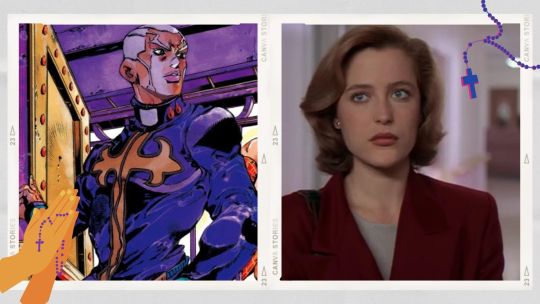
Propaganda below ⬇️
Enrico propaganda
He grew up in the church and became a priest. so devoted to his faith he ended the UNIVERSE to achieve the perfect world aka heaven
Hes Catholic but also so gay for this one vampire that he ended the world for him
He is LITERALLY one big metaphor for the catholic church as a villain. He’s a guy who believes himself to be a martyr on a fundamentally altruistic quest that will better humanity and the world, but in truth hes a destructive force blind to his faults and hypocritical of the atrocities he commits. Even his altruisim is just a lie (that he does believe himself though) because it all just stems from a deep rooted desire he has to alliviate the guilt he feels. Also hes obsessed with ”the world to come” to the point that hes downright nihilistic towards the current world he actually lives in, as well as the other people in it. which i mean. lol. Ultimately hes an insane delusional queen and he should win this because he is just That catholic. also he is a catholic priest :)
his names pussy bc he served cunt (in a catholic god honoring way)
I want my bestie’s guy in bere
No one could feel guilt to this level if not catholic
Religious Allegory mostly woth how his power(white snake) is contradictory it has white to make you think of good things but it contrast with snake a creature that tempted adam and eve. Although he is a Man of faith his stand’s design is far from it being incredibly intimidating and lined with the genetic of dna whihc is scientific compared to faith.
Bro tries to kill a child
serial killer priest bro
HE IS INSANE He spent his whole life believing in fate and when his world turned around Shakespeare tragedy style he made it his mission to bring 「HEAVEN TO EARTH」, which means TEARING AWAY THE FABRIC OF REALITY SO THAT EVERYONE IS AWARE OF THEIR OWN FATE. How does he get there? Simple! By using a half-baked horse to SPEED UP TIME UNTIL THE UNIVERSE RESETS AND LAUNCHES EVERYONE INTO A NEW WORLD. How did he GET this horse??? Oh, as one does - his (dead) best friend’s toe bone grew into a baby made of leaves that vored him, but he survived and grew even more eyebrows than he already had. And that’s without getting into the STUFF that makes him a phenomenal, S-tier, fine wine that EXPLODES and causes you to see VISIONS type of character. That’s just the surface. But, ah, that’s Catholics for ya. Vote Enrico Pucci for king of the Catholic tournament. 👍🏻
Dana Scully Propaganda
in a world of monsters and paranormal activity and alien conspiracies her faith is still important to her and I love her for it (well. that and many other reasons)
She’s a doctor but quit to become an FBI agent so she ends up just doing autopsies on people who died to ghosts or aliens. She is usually super factual and a huge skeptic, but she has repeated crises of faith and has to go to church to chill out. She feels guilty about everything constantly. Her family members remind her to be more catholic and then they end up dying and then she feels even worse. She gets abducted by aliens.
Most of her character arc revolves around struggling to square her faith with a) being a heavily skeptical scientist b) aliens being real (something she resisted very strongly on the grounds that she’s a skeptical scientist) c) being abducted and getting pregnant and nearly dying as a result of said aliens being real. Struggles with this so much that she’s in the confession booth like :grimace: especially because her investigative partner Mulder is a) an atheist b) believes in aliens just as strongly as she believes in Jesus
Refuses to believe in aliens because there’s absolutely no proof for it but then spends a whole ass episode trying to convince Fox “Aliens abducted my sister” Mulder that angels are real and can cause miracles. The sheer quantity of scientific qualifications she has only to turn around and say she wholeheartedly thinks biblical angels are 100% legit
#enrico pucci#father pucci#jojo’s bizarre adventure#cct polls#tumblr tournament#tumblr bracket#tumblr polls#r3#dana scully#the x files#x files
132 notes
·
View notes
Text
Controversial Character Tournament Round 2: Light Yagami from Death Note vs Edelgard von Hresvelg from Fire Emblem: Three Houses


(remember that these characters are fictional and your fellow tumblr users are real. please be normal in the notes, i will not hesitate to block if you harass people)
Propaganda under the cut, may contain spoilers:
Light Yagami:
LOVE:
- "He does some messed up things but have you considered: fucked up protagonists rock :)"
HATE:
- "this man makes me sick. ive genuinely had manic episodes over hating him. i have trauma from his existence in general. not even because of the murder. because hes a sexist cheater :("
- "My cousin and I frequently debate this. I think despite his 'intentions' he's ultimately a despicable character who cares for nobody but himself. She disagrees and says that he is just trying to do the right thing and making a difference in the world (she still thinks his actions are wrong, but she doesn't think he himself is despicable)"
BOTH:
- "I mean cmon man"
Edelgard Von Hresvelg:
LOVE:
"People either claim she's the hero or the irredeemable villain with no in between. She's also my lovely wife who has never done anything wrong in her life."
"I never even finished her route and remember nothing of what happens in that game but I DO remember the absolute warzone the fandom turned into because of her. She staged a coup and overthrew the head of the government/church and I think that's pretty cool of her. "But she committed war crimes!" God forbid women do anything."
"I lied in the previous question. I don't hate her or love her in fact I have never even played this game. But I keep finding people making up Discourse™ featuring wild accusations of bigotry towards both Edelgard fans and Edelgard haters so I feel that she belongs here. (Also my friend hates her. but HER friend loves Edelgard. So even in my small social circle there is a clear polarization.)"
"ok I don't have any solid propaganda because my opinion of her is more positive-neutral, but. she fits the spirit of this poll. trust me."
"[three houses spoilers] Yes she started a war but it was the only apparent way to break the chokehold the church had over everyone in Fodlan. Also she’s the only lord you can gay marry so I’m hopelessly biased"
"every time i go into the tag its either "edelgard is perfect no notes!!" or "edelgard is literally a fascist!!!". ive never seen someone with a neutral opinion of her. i yearn for battle."
"I know very little about her to be quite honest! But good god. As a fire emblem fan for the GBA and engage. I have NEVER seen such a decisive character like Edelgard. Jesus Christ. I still find stuff in those tags. What the hell!!!"
"I don’t even go to Fire Emblem but even I know that Edelgard has never done anything wrong, ever, in her entire life, and that if she did any war crimes they were a SUPER effective use of girl power. source: I am a lesbian. (realtalk I genuinely love a noble-minded extremist revolutionary and think Edelgard is a great character, so it’s kind of a shame that opinion on her seems to simply split down the line of “whether the person wants to kiss Edelgard or Dimitri more.”)"
HATE:
"So on the one hand, she's fully willing to kill and burn and murder her way to a "better future" at the expense of the present, but on the other hand she's pretty cool and #girlboss. She's also a canon gay romance option, but idk if that makes her more or less problematic."
"I just. I understand why people like her. I really do.
And I don't have anything new to say for why I dislike her. Edelgard fans and stans have heard everything. She has great points and motivation, but her methods are wrong. She hitches her ideals to the first good opportunity and never reconsiders her allegiance when things go off the rails. She hates the church for "lying to people" and proceeds to lie to her own populace herself in her own route. She gives Claude an opportunity to live because she knows he believes in her goals. But Dimitri and his Kingdom are too beholden to the church to ever be offered such mercy. She herself acknowledges that the change she wants to see is more quickly enacted through war than subtle and slow societal change. She recognizes the human toll of her actions, but she justifies it through flowery language and an insistence that the change needs to happen now or it never will. I honestly find her so interesting, and I agree with a lot of her thoughts about the need for societal change in the world of FE:3H. But people latched onto her and propped her up as someone who can do no wrong. And that just never sat right with me. I just think she’s a hypocrite who got put in front of a shiny means to her end and was immediately blind to every other opportunity around her."
BOTH:
- "I dont even play fire emblem but I cant escape people not shutting up about how much they love or hate her"
- "You said there were no hate answers for her...and I don't really hate her so it wouldn't be right but I wanted to balance things out some. She's the perfect storm of a character who sounds right and progressive and has a route all to herself that doesn't contradict that...but once you play other routes, it becomes clear she's kind of. full of misinformation. And attacking people who don't deserve it. Also a LOT of the divisiveness I'm willing to blame on the writers rather than her, for having her both be Evil Tyrant we NEED to take down and Sad Uwu Baby who just wants to eat cake and laze around and loves You the Player SO MUCH."
#poll#4 submissions#12 submissions#round 2#yagami light#light death note#light yagami#death note#edelgard von hresvelg#fe3h edelgard#edelgard fire emblem#fe3h#fire emblem#fire emblem three houses#fire emblem 3 houses
62 notes
·
View notes